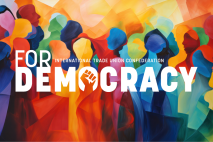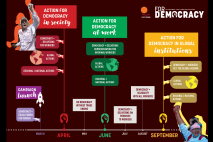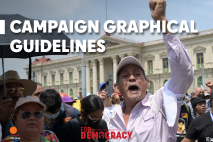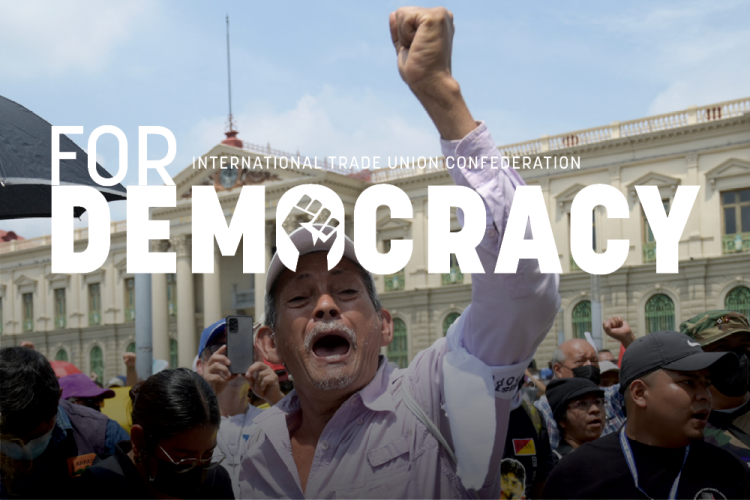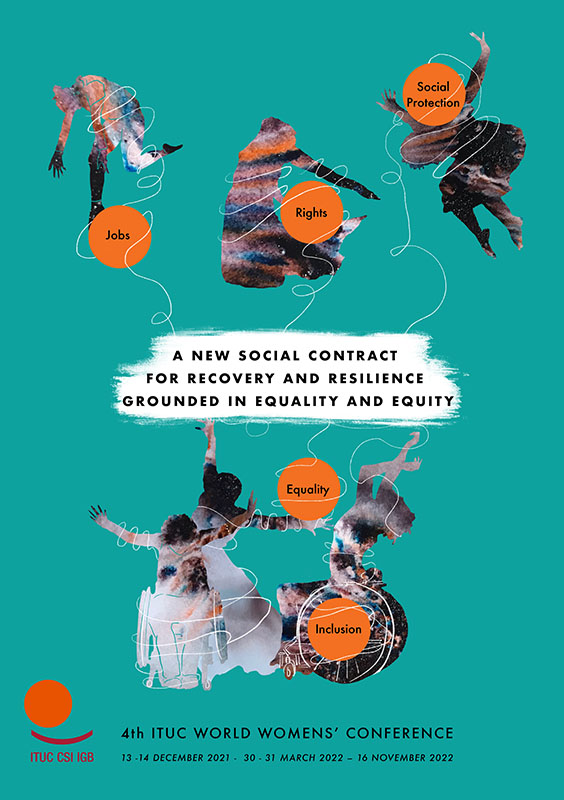Intro
The International Trade Union Confederation (ITUC) is the global voice of the world’s working people.
The ITUC’s primary mission is the promotion and defence of workers’ rights and interests, through international cooperation between trade unions, global campaigning and advocacy within the major global institutions.
Its main areas of activity include the following: trade union and human rights; economy, society and the workplace; equality and non-discrimination; and international solidarity.
The ITUC adheres to the principles of trade union democracy and independence. It is governed by four-yearly world congresses, a General Council and an Executive Bureau.
The ITUC regional organisations are the Asia-Pacific Regional Organisation (ITUC-AP), the African Regional Organisation (ITUC-AF) and the American Regional Organisation (TUCA). It cooperates with the European Trade Union Confederation, including through the Pan-European Regional Council.
The ITUC has close relations with the Global Union Federations and the Trade Union Advisory Committee to the OECD (TUAC). It works closely with the International Labour Organisation and with several other UN Specialised Agencies.
Intro
The objective of this youth campaign is to give some further tools for your organizing campaigns, some materials that can add other reasons to become unionised: all the work trade unions do on international level.
People all across the world join trade unions to get better pay and conditions at work, and the more people join, the stronger their union. Trade unions negotiate and represent workers in all types of sectors and in different kinds of jobs, and their members benefit from the “union advantage” of higher incomes and a better working life. Each trade union knows best how to encourage workers to join and how to organise union members in their own environment, work place or any other situation. There are just as many ways of organizing as there are work places and trade unions.
You are welcome to use the tools available to your own advantage and in any way you see fit. We suggest you think about including the following materials in your already existing recruitment campaigns and youth campaigns. If your union is not specifically focusing on reaching out to young workers, then maybe now is the time to start, and we hope that these tools will help.

Intro
For over a year the ITUC has conducted its campaign “No to Nuclear Weapons” for peace and against nuclear weapons. The campaign featured a world wide petition. Here you can read the petition in full.
We managed to get in total 6 704 493 signatures for the petition. They have been collected all over the world in all the regions and many, many different countries, both on paper and on-line. The petition was done in collboration with Japanese Trade Union Confederation Rengo and UNI Global Union.
The Review conference to the parties of the Non Proliferation Treaty was held in New York at the UN building beginning of May. All three organisations, ITUC; JTUC-Rengo and UNI Global Union, participated in the handing over of the signatures to the UN during the conference.
ITUC and JTUC-Rengo also hosted a seminar in New York with professor Gareth Evans from the International Commission on Nuclear Non-Proliferation and Disarmament as the key note speaker. The following speakers also participated: Guy Ryder, general secretary of the ITUC; Nobuaki Koga, President, JTUC-Rengo; Takaaki Sakurada, Chairperson of UNI Liaison Office in Japan; Mayor Tadatoshi Akiba from Hiroshima; Mayor Tomihisa Taue from Nagasaki; Trade Union participants from India: Thampan Thomas, HMS India and Chandrasekheran Raghavan, INTUC India Muhammad Zahoor Awan, PWF, Pakistan and Maung Min Nyo, FTUB, Burma, were also invited to the conference and the panel but neither could participate due to travel complications.
Thank you to all of you that has been signing our petition and supported our campaign. The ITUC continues to work for peace and disarmament although this specific campaign has come to an end.
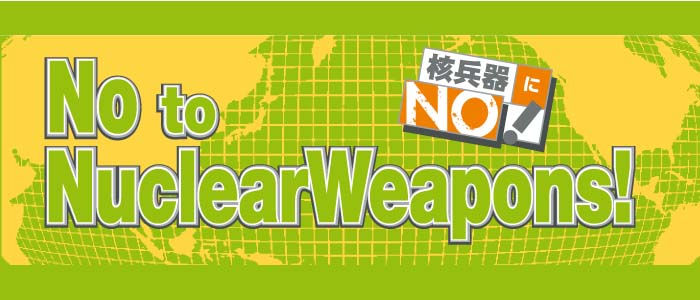
Intro
Forced labour is any work or service performed against a person’s will under the threat of punishment. Found increasingly in the private economy in labour intensive and under-regulated sectors such as construction, agriculture, fisheries, domestic work, and mining as well as in prostitution, more than 12.3 million people are in forced labour today, and almost all countries are affected.
Child labour refers to work for children under the age of 18 that is mentally, physically, socially and/or morally dangerous or harmful and that interferes with their schooling. Forced labour and child labour are closely linked. They occur in the same geographical areas, the same industries and are mainly caused by poverty and discrimination, and up to half of all people in forced labour are children.
Intro
Decent Work Decent Life for Women is a global campaign that aims at gender equality at work and in the trade unions.
The key objectives of the campaign are:
![]() to advocate decent work for women and gender equality in labour policies and agreements
to advocate decent work for women and gender equality in labour policies and agreements
![]() to seek gender equality in trade union structures, policies and activities and a significant increase in the number of women trade union members and women in elected positions.
to seek gender equality in trade union structures, policies and activities and a significant increase in the number of women trade union members and women in elected positions.
For 2010, Decent Work Decent Life for Women Campaign is focusing on organising young women workers.
Since its launch on 8 March 2008, 102 trade unions affiliates from 64 countries are supporting and participating in the campaign.
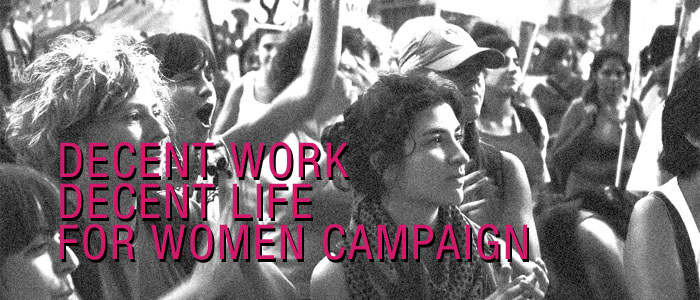
Intro
The ITUC works actively with its affiliates in positioning the labour movement in the climate agenda – on the need for a fair, ambitious and binding agreement in the UNFCCC, on emission reduction targets and differentiated responsibilities, on financing climate policies, among others – and on developing a comprehensive strategy for a “just transition” for workers and communities to ensure we all are part of a sustainable, low-carbon economy and benefit from decent and green jobs.
Intro
Today millions of workers worldwide are denied jobs, confined to certain occupations or offered lower pay on account of their sex, religion, colour, nationality, ethnic origin, sexual orientation, political opinions, social origin, age or disability. Discrimination at work is widespread, persistent, and becomes more insidious over time, taking on new forms such as bias against people living with HIV/AIDS. A more equal distribution of job opportunities, productive resources and assets, including education, is urgently needed.
Achieving equality at work is a key objective of the trade union movement. The ITUC and its affiliated organisations work to oppose discrimination, to promote equal opportunity and to encourage diversity at the work place. Ensuring the adoption and enforcement of effective legislation is indispensable but not enough. Social dialogue and collective bargaining are key instruments for eliminating discriminatory practices. Trade unions’ campaign and mobilisation activities provide the necessary support required to challenge entrenched stereotypes and prejudices and to elicit public policy responses. By reaching out to people experiencing discrimination, trade unions are not only providing them with a stronger platform from which they can claim their rights; unions are, by the same token, increasing their capacity to organise all groups in our diverse societies.
Intro
The ITUC seeks to increase intergovernmental cooperation to ensure that the social dimension of globalisation, including decent work and fundamental workers’ rights, is right at the centre of decision-making at the world’s major global and regional institutions. This includes the G-20, the World Bank, the International Monetary Fund (IMF), the World Trade Organisation (WTO), and the United Nations and its specialised agencies, especially the International Labour Organisation (ILO) with its tripartite structure and mandate to set international social standards.
Intro
HIV/AIDS affects the most productive in the population, namely the labour force. The ITUC is convinced that the workplace is a key battleground in the struggle against the HIV/AIDS pandemic. The employers’ and workers’ organisations have a specific role in promoting and supporting national and international efforts on HIV/AIDS in and through the world of work. And the workplace has a role in securing a non-discriminatory environment for people living with HIV.
Intro
The ITUC Solidarity Fund gives assistance to trade union action in the countries where it is most needed. It helps organisations and individuals facing hardship or repression, and supports trade union campaigns, organising and strengthening capacities and structures. The oversight and management of the Fund is done by the Solidarity Fund Management Board. Allocations from the Fund are decided by the Board, which is chaired by ITUC Deputy President Cathy Feingold.
The Board reports to the ITUC General Council.
The Fund is financed by voluntary contributions from ITUC affiliates.
Intro
The Trade Union Development Cooperation Network (TUDCN) is an initiative of the International Trade Union Confederation (ITUC) that aims at
- bringing the trade union perspective and promoting the ILO’s Decent Work Agenda in development policy processes, including the 2030 Agenda;
- improving the coordination and effectiveness of trade union development cooperation initiatives; and
- building the capacity of trade union organisations.
The TUDCN interacts with key global institutions discussing development and development cooperation strategies, such as the United Nations, the Development Assistance Committee to the OECD (DAC), the Global Partnership for Effective Development Effectiveness (GPEDC) and the European Union.
The TUDCN brings together national trade union organisations affiliated to the ITUC, the ITUC regional organisations in Latin America and the Caribbean (TUCA), ITUC-Africa and ITUC-Asia Pacific , the Global Union Federations (GUFs), the European Trade Union Confederation (ETUC), the Trade Union Advisory Committee to the OECD (TUAC) and trade unions’ solidarity support organisations (SSOs).
Find out more about TUDCN activities | Subscribe to our newsletter
This initiative receives the support of the European Union
![]()
Intro
Women have increasingly become part of the paid workforce and of trade unions, and there have been important achievements in organising, collective bargaining, and rights. Yet they remain overrepresented in precarious, low-skilled, low-paid jobs with little prospects for career advancement.
The ITUC and its affiliated organisations work together to advance women’s rights and gender equality. The ITUC actively promotes equality at the workplace and the full integration of women in trade unions including in their decision making bodies.
Intro
Young people are critical to the future of trade unionism and to the strength, effectiveness and legitimacy of trade union organisation. Youth does not reject trade unionism and often identifies strongly with its principles and values. However, they too frequently face difficulty in finding their place in trade union structures and activities. It is crucial that unions respond better in their policies and activities to the needs and expectations of young workers, make them feel welcome and remove the obstacles that prevent their full participation.
Intro
Delegates to the 2nd ITUC World Congress will be coming from countries which are all experiencing, in different ways and to different degrees, the impact of the global crisis. For the people they represent that has often meant acute hardship and great insecurity. And for their trade unions it has made old problems more acute and added new ones to them.
Trade unions are not alone in trying to find a way out of the crisis and to make sure that what comes after it is very much better than what came before and insures against repetition of the injustices and suffering of the past. But with many of the causes of the crisis firmly rooted in the world of work, and with many of them being global in scale, the international trade union movement faces particular challenges which bring with them both responsibilities and some opportunities.
The ITUC’s conviction is that after decades of injustice it is now the turn of the people – all of them – to enjoy the benefits of globalisation and that the path forward from the crisis must lead directly to global social justice.
Intro
Sports-fans, workers, activists and consumers worldwide have united in a campaign to make sure that sports events will be fair for workers making sporting goods and building venues as well as fair for athletes – no matter whether it’s the Olympics, UEFA, FIFA, the Commonwealth Games or any other sports event. Internationally agreed upon standards should be respected in the workplace as well as in the stadium.
Intro
Since its founding in 2008, millions of people have taken part in events for the World Day for Decent Work (WDDW), 7 October, demanding that decent work be placed at the centre of government action for economic growth, building a new global economy that puts people first, based around the New Social Contract.
No action is too big or too small for the WDDW – i.e., a workplace discussion, a huge demonstration, a protest letter or something completely different.
Whatever you choose to do to mark the WDDW, please keep us informed by sending your information and questions to [email protected].
Look at the stories below for an understanding of the issues the WDDW entails, such as:
- Wage justice
- Workplace rights
- Collective bargaining
- Living minimum wages
- Job plans and decent work
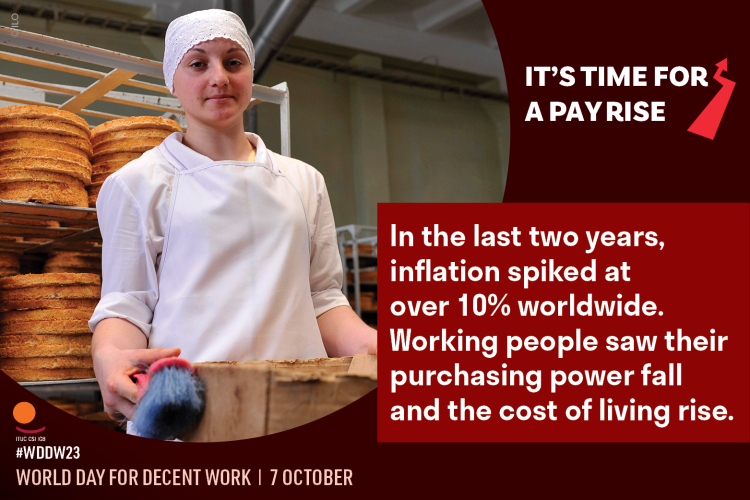
Intro
Together with its affiliates, its regional organisations, the Global Union Federations, as well as with non-governmental organisations, the ITUC carries out ongoing campaign action for the universal respect of trade union rights, as guaranteed by the Conventions of the International Labour Organisation (ILO).
The ITUC defends trade unionists whenever their fundamental human rights are violated as a result of their trade union activities. It also takes action against other labour rights violations, and other violations of human rights especially where these affect working people.
Intro
The ILO Decent Work Agenda was initiated by Juan Somavia, who took over as ILO director general in 1999. In a relatively short period of time, the concept has led to an international consensus that productive employment and decent work are key elements to achieving poverty reduction. In the final outcome statement of the UN World Summit in September 2005, 150 global leaders agreed to place full and productive employment and decent work as a central objective of relevant national and international policies.
To encourage nations to live up to this joint statement, five organisations — Solidar, ITUC, ETUC, World Solidarity and the Global Progressive Forum — launched the Decent Work, Decent Life campaign at the World Social Forum in Nairobi in January 2007 and have since then worked in an alliance to make access to Decent Work Decent Life possible for all people of the world. The need for decent working conditions in order to live a decent life is more important than ever.
The Decent Work campaign is about:
![]() building awareness of Decent Work amongst citizens, decision makers and key institutions;
building awareness of Decent Work amongst citizens, decision makers and key institutions;
![]() showing that Decent Work is the only sustainable way out of poverty and is fundamental to build democracy and social cohesion; and
showing that Decent Work is the only sustainable way out of poverty and is fundamental to build democracy and social cohesion; and
![]() placing Decent Work at the core of development, economic, trade, financial and social policies at the national, European and international level.
placing Decent Work at the core of development, economic, trade, financial and social policies at the national, European and international level.
The alliance has been urging individuals and institutions to sign a Call to Action for Decent Work, Decent Life for two years. On the World Day for Decent Work on 7 October 2009, the alliance handed over the signatures and endorsements of the Call to Action to several institutions all over the world: to the African Union in Ethiopia; to the Organization of American States during a meeting in Buenos Aires, Argentina; to the World Trade Organization in Switzerland; to the European Parliament in Brussels, Belgium; and to the World Bank and International Monetary Fund in a meeting in Istanbul, Turkey.
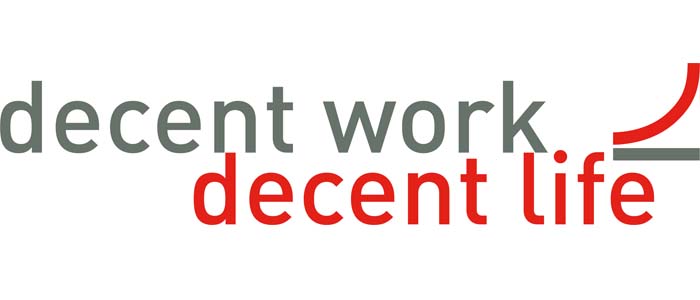
Intro
Decisions for Life Campaign supports and empowers young women, individually and collectively, to make well-informed decisions about work, career and family, have access to secure jobs, earnings and social benefits, demand equal opportunities at work, and improve their leadership and negotiation skills.
The campaign is part of the Decisions for Life project, which focuses on young women workers in eight large occupational groups in the service sector, and aims to achieve better working conditions for young women and increase the number of young women as trade union members and leaders.
To reach these women, the project is deploying a triple approach combining grassroots trade union campaigns at national level, media web technologies and research activities.
The project is currently implemented in 14 countries.
Intro
March 8 is International Women’s Day (IWD), which has its origins in the protests, strikes and marches of women trade unionists. Over the years, IWD has evolved into an internationally recognised day to draw attention to womens’ rights and equal participation in all scenes of political, economic and social life.
Around this day every year, the International Trade Union Confederation is releasing special reports, videos or campaigns to bring public attention to the problems faced by women around the world.
Intro
Over 200 million people are working outside their country of birth or citizenship. Together with their families, migrant workers make up the large majority of all international migrants. Therefore, migration is first and foremost a labour issue. It is about people moving to find decent employment for a better future for their families.
Most countries are origin, destination or transit countries of migrant workers, and many countries are all three. Unfair treatment of migrant workers undermines wages and working conditions for all workers. Ensuring the protection of migrants’ rights is essential to achieve Decent Work for all men and women. Migrants’ rights are workers’ rights.
RATIFICATIONS OF INTERNATIONAL CONVENTIONS ON MIGRATION
MIGRANTS’ RIGHTS ARE WORKERS’ RIGHTS
ILO Convention No. 97: The Migration for Employment Convention (Revised) 1949, provides for equality of treatment between national and migrant workers in wages, social security and trade union activities.
ILO Convention No. 143: The Migrant Workers Convention (Supplementary Provision) 1975, protects the basic human and workers’ rights of all migrant workers, and provides measures to combat abuses such as smuggling and trafficking.
UN Convention on the Protection of the Rights of All Migrant Workers and Members of Their Families (ICRMW): The International Convention on the Protection of the Rights of All Migrant Workers and Members of Their Families (1990) ensures that all migrants, regardless of their migratory status, have their basic human rights respected and have access to a minimum degree of protection throughout the migration process: preparation, recruitment, departure, transit, stay, potential return and reintegration.
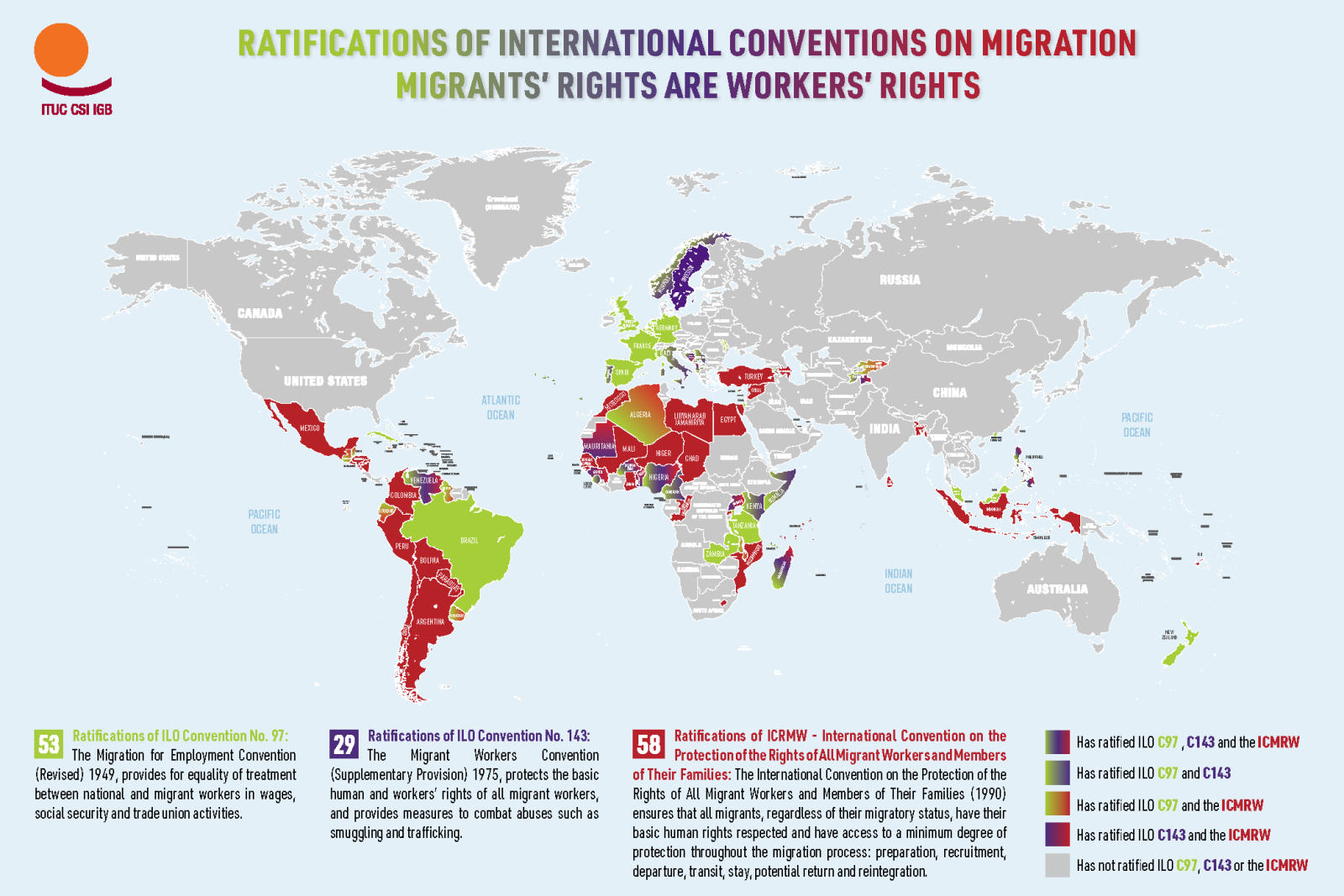
- Ratifications and signatures of international conventions on migration in EUROPE
- Ratifications and signatures of international conventions on migration in AFRICA AND MIDDLE EAST
- Ratifications and signatures of international conventions on migration in THE AMERICAS
- Ratifications and signatures of international conventions on migration in ASIA-PACIFIC
Intro
Workers and trade unions will not let this happen!
Is there a catastrophic environmental situation in your community, country or region?
Does this situation have horrific natural, social and economic consequences? If your answer is yes, REACT! Share your situation and experience with other workers around the world!
The ITUC is launching its “7 Horrors of the World” campaign on the seven worst environmental situations in the world. These situations are ones that have horrendous consequences on workers, communities and the environment at the global, regional and local level.
We need to work for a greener economy that respects both the people and the environment! It is time to tell your story and refuse to accept the environmental horrors of the world! Trade unions know that any harm to the planet is a threat to every worker in the world, and we will not ignore this!
The ITUC is launching a special environmental campaign, the “’7 Horrors of the World”, to show the world how environmental degradation affects workers and how workers are willing to act for a just transition towards a greener economy. We need to improve the lives and livelihoods of workers all around the globe and make sure we can provide decent work opportunities.
Your submission on a horrific situation must show the impacts of unsustainable production on people and the environment.
Please send us all the information you have on your horror. An online vote will be organised to select the worst seven horrors of the world at the end of 2011. Nothing is too small or too big to be submitted as a candidate for the worst environmental horrors of the world. It can be devastating to a few people or to many.
The results will be presented in the World of Work Pavilion in Durban, South Africa, during the international climate change negotiations in December 2011.
Intro
The End of Modern-day Slavery: There are over 100 million workers employed to do work in someone else’s house all over world. These domestic workers clean, cook, do laundry, provide care to children and the elderly and lots more. Their work is undervalued, underpaid, invisible, not recognised, and not respected. The majority of domestic workers are women (82%) – many are migrants or children.
In many countries domestic workers are excluded from labour legislation and social protection schemes. Many are denied the right, either in law or in practice, to form or join a trade union. As a result, mistreatment, exploitation, violence, and physical and sexual abuse are frequent and often go unpunished.
In June 2011 the UN body that deals with labour issues, the International Labour Organisation (ILO), adopted Convention 189 (C189) and Recommendation 201 (R201) on Domestic Workers.
Convention 189 recognises the right of domestic workers to join and form trade unions, which is still forbidden in many countries. It also protects the right to minimum wage in countries where it exists, and protects monthly payments and access to social security including in the case of maternity. The Convention gives domestic workers one day off per week and regulates their working hours.
In essence, the Convention guarantees that domestic workers are treated as any other worker under labour legislation. This Convention will enter into force once two countries have ratified it.
12 by 12 campaign
In December 2011, the International Trade Union Confederation (ITUC) launched the “12 x 12” worldwide campaign on getting 12 countries to ratify ILO Convention No 189 by the end of 2012. The campaign has already mobilised 12 by 12 coalitions in 73 countries, demanding the ratification of Convention No 189 and better national laws. The 12 by 12 coalitions take various actions to get the attention of decision makers, organise public events to promote ILO Convention No 189 and reach out to groups and organisations supportive of domestic workers rights.
Keep up the pressure and call for the ratification of ILO Convention No189!
What can you do?
- Check the 12 by 12 website
- Put the 12 by 12 logo on your website and join us on Facebook where hundreds of activists
- Connect and share information and updates on the ’12 by 12’ campaign: http://www.facebook.com/groups/174009729373613/#!/groups/231305920281513/
- Take actions and organise events with domestic workers, trade unions and supportive organisations as part of the ’12 by 12’ campaign. Invite the media, take pictures and post them
on the web! - Promote the 12 by 12 campaign and raise the importance of ILO Convention No 189 at all fora, meetings and events in which you take part.
- Write letters, articles, tweets on the 12 by 12 campaign.
- Sign up to the ’12 by 12’ newsletter ([email protected]) .
- Speak up in defence of domestic workers rights!
- Much more
Join our campaign to support the rights of domestic workers in your country!
The 12 by 12 Campaign is an initiative of the International Trade Union Confederation (ITUC) in partnership with the International Domestic Workers Network (IDWN), the European Trade Union Confederation (ETUC) , Public Service International (PSI), The International Union of Food, Agricultural, Hotel, Restaurant, Catering, Tobacco and Allied Workers’ Associations (IUF), Human Right Watch, Anti-Slavery International, Solidar, Migrant Forum Asia (MFA), World Solidarity and Caritas.

Intro
In RIO+20 the ITUC is calling on all affiliates to mobilize for a more equitable, just and sustainable world.
Photo: http://alter-echos.org/
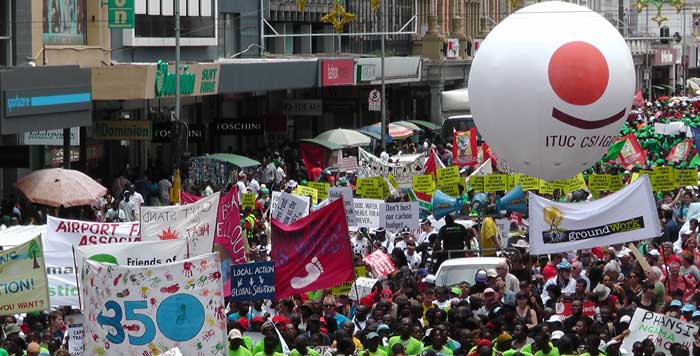
Intro
Hearings – Read workers testimonies to the ITUC global panel of inquiry
Panelists – Meet the panelists taking part in the inquiry
Submissions – Tell us if your rights at work are under threat
Frontline Countries – See where the new frontline on workers’ rights has been drawn
Line in the Sand – In October, the inquiry report will be presented to the General Council
Intro
The Trans-Pacific Partnership Agreement (TPPA) would establish a comprehensive free trade area in Asia-Pacific. The Agreement is still under negotiation, and it aspires to address in a comprehensive manner both ‘traditional’ and ‘21st century trade-related issues’ that include strong protection of investment and intellectual property rights, regulatory coherence and government procurement.
National trade union centres in some of the 11 participating countries and the ITUC endeavour to improve the Agreement’s provisions so that it could benefit workers as well as remove any provision that could damage public interest. The trade union efforts also aim at achieving the inclusion of an ambitious and binding Labour Chapter. The TPPA comprises Australia, Brunei, Canada, Chile, Malaysia, Mexico, New Zealand, Peru, Singapore, United States, and Vietnam.
Intro
The 2030 Agenda for Sustainable Development is the reference document on development priorities at the international level. It was adopted by the United Nations in September 2015, by 193 countries, and builds on the Millennium Development Goals MDGs, 2000-2015), which aimed to reduce extreme poverty. The 2030 Agenda contains a set of shared objectives, known as the Sustainable Development Goals(SDGs), to which all countries have committed. The 17 SDGs cover issues highly relevant to the work of trade unions, including the promotion of decent work, the fight against poverty, inequalities and climate change, and they recognise the need for greater gender equality, free quality education, public services and stronger institutions.
Trade unions, through the Trade Union Development Cooperation Network (TUDCN)Trade Union Development Cooperation Network (TUDCN), are heavily involved in the SDG process at global, regional and national level. Through their everyday work on upholding freedom of association, social dialogue and collective bargaining, and on promoting decent work and the rights of working people, trade unions are instrumental to achieving the SDGs. As outlined in their Strategy on the 2030 Agenda, TUDCN members are conducting their own national monitoring and analysis to make sure that countries are on track to fulfil their commitments. The review takes into account the trade union priority SDGs: SDG 1 (end poverty), SDG 5 (gender equality), SDG 8 (decent work), SDG 10 (reduced inequalities), SDG 13 (climate action) and SDG 16 (peace, justice and strong institutions). The reviews will be promoted during the UN’s High-Level Political Forum (HLPF) and the UN regional fora on sustainable development, which are the follow-up and review mechanisms of the 2030 Agenda.
The key messages emerging from the trade unions’ national monitoring and analysis are presented in the country profiles, available below.
Intro
The International Monetary Fund (IMF) and World Bank, which began operations shortly after the Second World War, were established with the missions of providing for global financial stability and for post-war reconstruction. The International Monetary Fund initially only lent to governments in crisis so as to ensure the stability of the global financial system but later became involved in longer-term lending, especially to low-income countries. The World Bank Group’s stated focus is on economic development and poverty reduction. It provides loans and grants to governments and loans and guarantees to the private sector in developing and emerging-market economies.
Several multilateral investment banks with specific regional focuses have also been created to support economic development. These include the Inter-American Development Bank, the African Development Bank, the Asian Development Bank, and European Bank for Reconstruction and Development.
Trade unions became particularly concerned by the programmes of the international financial institutions (IFIs) in the 1980s when they began applying structural adjustment and austerity policies as conditions for their loans. These conditions have often had a major impact on levels of employment, real wages and social programmes and remain a serious concern for the trade union movement.
Consistent with the ITUC’s work on the social dimensions of globalisation, it advocates at the IFIs for policies that give priority to sustainable decent work creation instead of the privatisation, deregulation and austerity policies that have characterised many of their interventions. The ITUC has called for the incorporation of respect for fundamental workers’ rights and decent work into the institutions’ policy advice and lending operations. This includes advocacy in support of expanded social protection, and respect for international human rights and labour standards. The ITUC also works to promote appropriate rules and practices governing the behaviour of private businesses that receive financial support from the IFIs.
The ITUC/Global Unions Washington Office, which is a joint office of the ITUC and the Global Union Federations, represents the concerns of the global labour movement at the International Monetary Fund, World Bank and regional multilateral development banks.
Intro
Hunger. Unemployment. Exploitation. Violence. Diseases. Climate Change. The list of bad news in our planet looks like a never-ending one. And yet the list of those at the forefront of the consequences is quite short: working people, their families, their communities, their environment.
Over the past decades people have been forced to find solutions on their own. Well, the labour movement is convinced that we need collective approaches, and global commitments to put an end to these challenges.
The United Nations can contribute to the transformation we need. Through the development of new goals for humanity, an ambitious deal on climate change and the development of instruments to help workers in the transition to sustainability governments still have a chance to respond to the challenges their citizens are facing and contribute to a fair, sustainable world.
How a future for working people looks like? Well, enter the debate, add your voice!
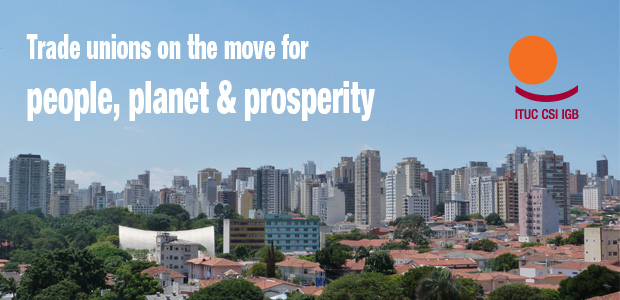
Intro
Domestic workers face systematic exploitation and abuse at the workplace. The historical adoption of ILO Convention 189 on domestic work on 16 June 2011, (accompanied by the adopted Recommendation 201), has brought respect and recognition for the 50 to 100 million domestic workers around the world. The majority are women, and many are migrants and children.
Since the ITUC launched the ‘12 by 12’ campaign in partnership with IDWN/IUF and others, more than 10 million domestic workers have seen their rights improved either through ratification of C189, labour law reforms or collective bargaining agreements. And more than 20,000 domestic workers have joined a union.
Intro
The Count Us In! campaign engages men and women to bring about change: more women in trade union leadership positions and concerted efforts to organise more women in unions.
Intro
The main objective of the Platform is to promote the organisation and recruitment of young workers in unions by mapping, sharing and promoting innovative and successful union strategies and activities. The Platform aims to build a global network of young trade union activists and organisers from the ITUC affiliates who are willing to:
![]() Share their experiences and best practices on organising/recruiting young workers;
Share their experiences and best practices on organising/recruiting young workers;
![]() Strengthen their current organising campaign(s) targeting young workers;
Strengthen their current organising campaign(s) targeting young workers;
![]() Launch organising campaign(s) for young workers.
Launch organising campaign(s) for young workers.
Intro
The Women’s Organising Assembly (Dakar, Senegal 19-21 November 2013) marks a strategic moment in the critical fight to reclaim our democracies, our communities, the dignity of work and our rights as women and as workers.
Intro
For more information, please visit our website : http://www.rerunthevote.org
Intro
The Labour 20 – L20 - represents the interests of workers at the G20 level. It unites trade unions from G20 countries and Global Unions and is convened by the International Trade Union Confederation (ITUC) and Trade Union Advisory Committee (TUAC) to the OECD.
Since the outbreak of the financial crisis in 2008, the L20 engages around the G20 inter-governmental process to ensure inclusive and constructive dialogue on ‘Jobs and Growth’ as one of the official outreach groups together with the Business 20 (B20) and other outreach groups. Read more on the G20/L20 2008-2018.
The L20 conveys key messages of the global labour movement at the Employment Working Group and Sherpa meetings, Labour and Finance Ministers meetings and G20 Summits. Joint consultations of social partners with Leaders as well as Labour Ministers are an integral part of the G20 process.
Members of the L20 formulate key messages in a broad consultative process and confirm policy goals at the L20 Summit for each G20 presidency.
L20’s policy and advocacy will centre on:
- continuing the work of the sub-group on labour income share, and on decent work especially in supply chains and the transformation of work;
- addressing income inequality with minimum wages and collective bargaining, respect for labour rights, and social protection;
- increasing investment in infrastructure and the care economy;
- closing the gender pay gap together with measures to increase women’s labour market participation;
- preparing workers for a job-rich, rewarding Future of Work;
- addressing adverse effects of digitalisation and plurilateral e-commerce rules on labour markets and regulatory frameworks;
- promoting tax transparency and accountability;
- policy coordination to achieve a just transition to a carbon neutral economy and the digital transformation;
- protecting migrants’ labour rights; and achieving the Agenda 2030.
The L20 has consistently pressed:
- to generate investment to create quality jobs;
- to scale up quality apprenticeships and skills;
- to ensure the formalisation of work through minimum wages, labour rights and social protection floors;
- to achieve sustainable, green and inclusive growth;
- to ensure fair income distribution;
- to re-regulate the financial sector;
- and to follow-up on the implementation of G20 past and future commitments.
Intro
Held prior to the G20 high-level meetings and social partner consultations, the Labour 20 Summit provides the opportunity for representatives to jointly prepare policy recommendations and key messages to G20 Leaders and Ministers. Those priorities are subsequently issued in a L20 Statement to governments.
Confronted with the urgency of the 2008 financial crisis, General Secretaries and Presidents of G20 trade unions have been meeting from the very first G20 Leaders’ Summit in Washington onwards. The first formally recognized L20 Summit took place in Cannes just before the Leaders’ meeting and was followed by Summits in Los Cabos (2012) and Moscow (2013).
The L20 Summit creates a forum for discussion for the global labour movement on its future engagement with the G20 and invites a wide range of stakeholders from governments, international organisations, civil society and business as guest speakers to enable exchanges on the future directions of global policies and governance. One of the outcomes has been a joint B20/ L20 commitment to scale up quality apprenticeships in 2013 as well as discussions on next steps for the B20/L20 collaboration.
The next L20 Summit will take place in Brisbane in November 2014 under the Australian G20 Presidency. The ITUC and TUAC work in tandem with the central trade union confederation in the respective host country to prepare the Summits. In 2014, the Australian Council of Trade Unions (ACTU) is the Australian host organisation and partner of the L2O.
Intro
18 February 2015 designated by the ITUC General Council as a global day of action in defence of the right to strike, was a resounding success with activities right across the world. See below for examples of the actions held in different places
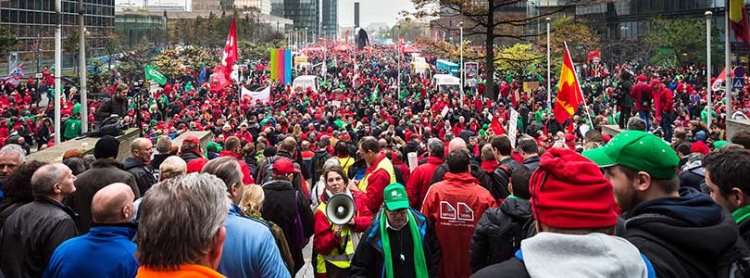
Intro
Held prior to the G20 high-level meetings and social partner consultations, the Labour 20 Summit provides the opportunity for representatives to jointly prepare policy recommendations and key messages to G20 Leaders and Ministers. Those priorities are subsequently issued in a L20 Statement to governments.
Confronted with the urgency of the 2008 financial crisis, General Secretaries and Presidents of G20 trade unions have been meeting from the very first G20 Leaders’ Summit in Washington onwards. The first formally recognised L20 Summit took place in Cannes just before the Leaders’ meeting and was followed by Summits in Los Cabos (2012), Moscow (2013) and Brisbane (2014).
The L20 Summit creates a forum for discussion for the global labour movement on its future engagement with the G20 and invites a wide range of stakeholders from governments, international organisations, civil society and business as guest speakers to enable exchanges on the future directions of global policies and governance. One of the outcomes has been a joint B20/L20 commitment to scale up quality apprenticeships in 2013 as well as a joint letter to Leaders on common priorities in 2014.
The next L20 Summit will take place in Antalya in November 2015 under the Turkish G20 Presidency. The ITUC and TUAC work in tandem with trade union confederations in the respective host country to prepare the Summits. In 2015, the L20 Steering Committee is chaired by the Türkiye Isçi Sendikalari Konfederasyonu (TÜRK-IS) and includes the Devrimci Isçi Sendikalari Konfederasyonu (DISK) and the Türkiye Hak Isçi Sendikalari Konfederasyonu (HAK-IS).
Intro
ITUC Climate Justice Frontline
No jobs on a dead planet
#Unions4Climate action
Climate action is a trade union issue. We must mobilise to hold our leaders to account for the commitments that will ensure a strong global agreement on climate change in Paris this year and beyond.
From our workplaces, to our governments, in our homes and on the streets, unions will mobilise so that we have a right to a seat at the table as we act to stabilise the world’s climate by moving to a zero carbon emission future.
See us in action at the global week of action for climate justice, national campaign events, and share your workplace and country pledges.
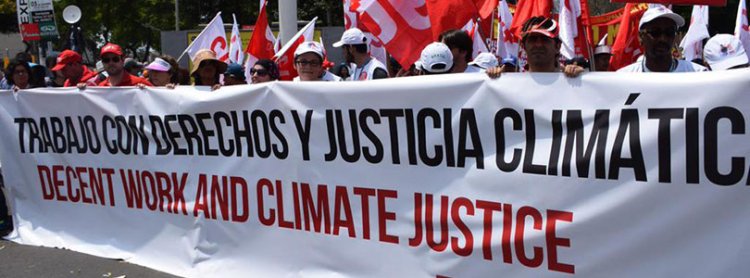
Intro
#RATIFYC190 FOR A WORLD OF WORK FREE FROM VIOLENCE AND HARASSMENT
NEW: #RatifyC190 campaign toolkit
Whilst both women and men experience violence and harassment in the world of work, unequal status and power relations in society and at work often result in women being far more exposed to violence and harassment.
Gender-based violence remains one of the most tolerated violations of workers’ human rights. According to statistics, 35% of women - 818 million women globally - over the age of 15 have experienced sexual or physical violence at home, in their communities or in the workplace.
In June 2019, the International Labour Conference adopted a set of robust and forward-looking international labour stardards in the form of Convention 190 (C190) and Recommendation 206 (R206) that aim at preventing and addressing violence and harassment in the world of work, including gender-based violence and harassment.
The ITUC campaign #RatifyC190 – for a world of work free from violence and harassment aims to:
- Ensure wide ratification of ILO C190 and effective implementation of C190 and R206 to realise a world of work free from violence and harassment with a strong focus on the elimination of gender-based violence and harassment.
- Mobilise and strengthen trade union action for the elimination of gender-based violence and harassment from the world of work.
- Raise public awareness around ILO C190 and R206.
Download the social media pack here:
RATIFY C190 for a world of work free from violence and harassment
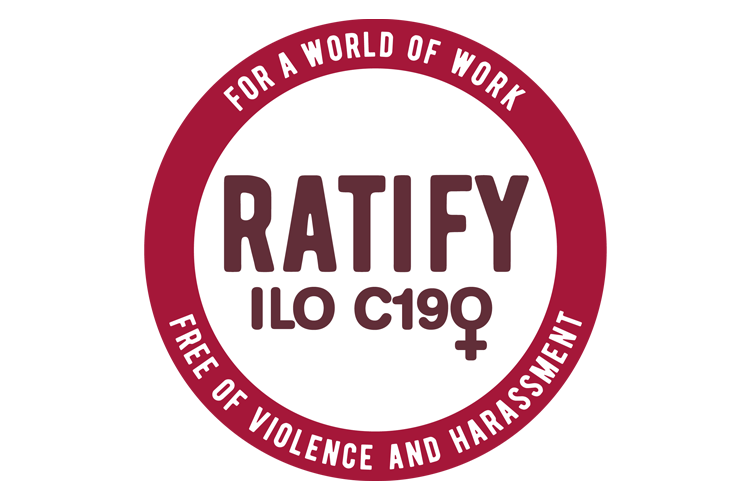
Intro
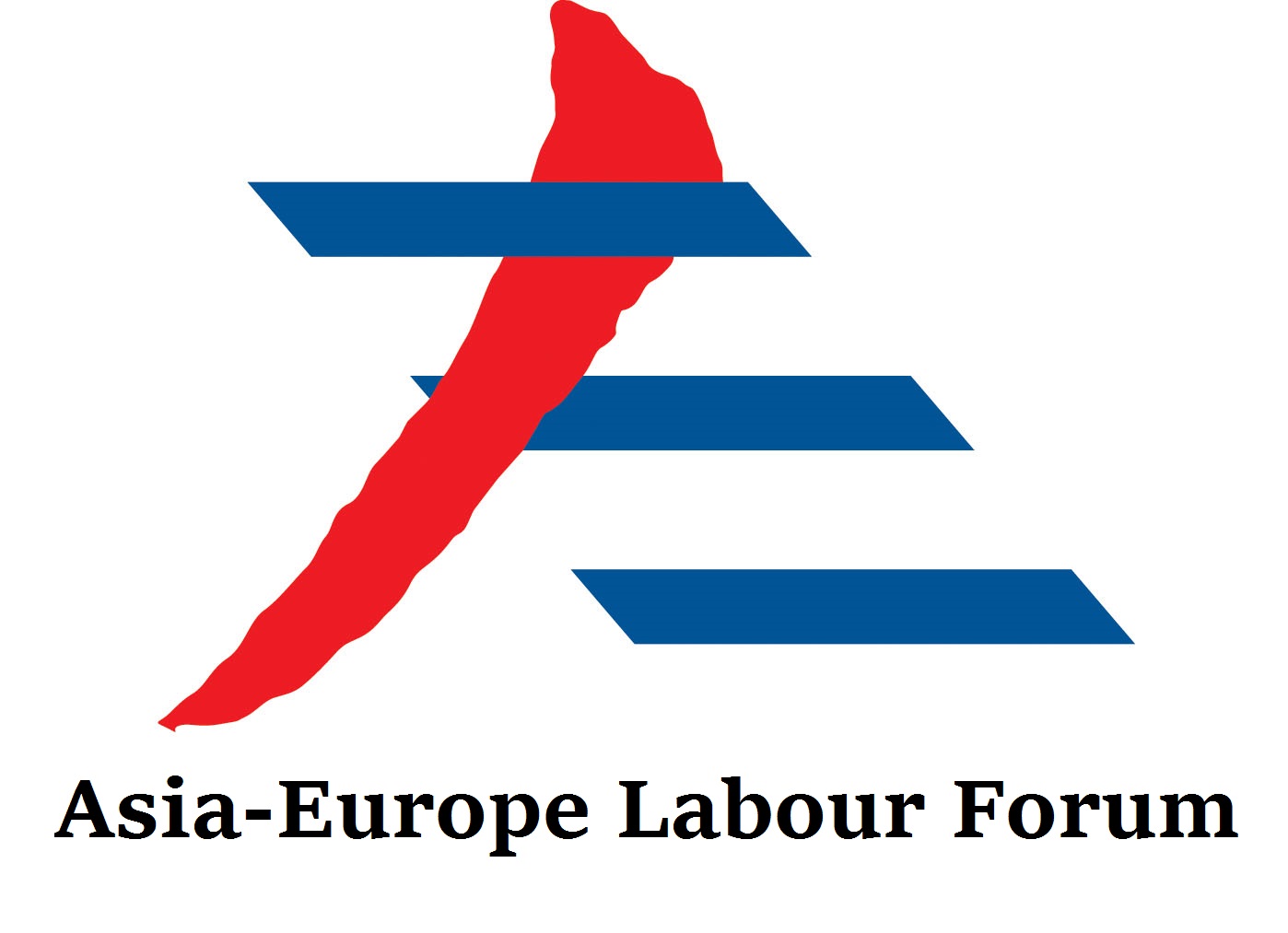 The Asia-Europe Labour Forum (AELF) consists of trade union centres that engage the Asia-Europe Meeting (ASEM) process in order to make social justice and development central in the agenda of ASEM Ministers and Heads of State.
The Asia-Europe Labour Forum (AELF) consists of trade union centres that engage the Asia-Europe Meeting (ASEM) process in order to make social justice and development central in the agenda of ASEM Ministers and Heads of State.
In this webpage you can find information on who we are, what we aim at, a brief history of our long engagement with the ASEM process, documentation and news.
"The Asia Europe Labour Forum is supported by the FES.
Intro
Global Supply Chains = Exploitation
Eighty per cent of world trade and 60% of global production is now captured by the supply chains of multinational companies. The majority of supply chain workers are trapped in insecure and often unsafe jobs with poverty wages and long hours. Informal work, forced overtime and slavery are also found in the mix.
A recent ITUC report shows that 50 of the world’s largest companies directly employ just 6% of the workers in their supply chains – the remaining 94% are part of the hidden workforce of global production.
Governments are beginning to wake up to the problem, and the G7, the G20, the ILO and the OECD have accepted that something needs to be done.
We need to mobilise to transform the supply chain model into a system that works for working people. This means putting the rule of law, the right to organise and bargain collectively, at the centre. It means solidarity in every part of the supply chain with those who are trying to build workers’ power.
This site is dedicated to promote the work of unions and allies in the fight for decent work in supply chains.
Please post your reports, the stories of workers and the organising campaigns that we can all support.
By exposing the practices of these companies to consumers and citizens around the world, companies can be held accountable and made to take responsibility for their supply chains and follow the rule of law.
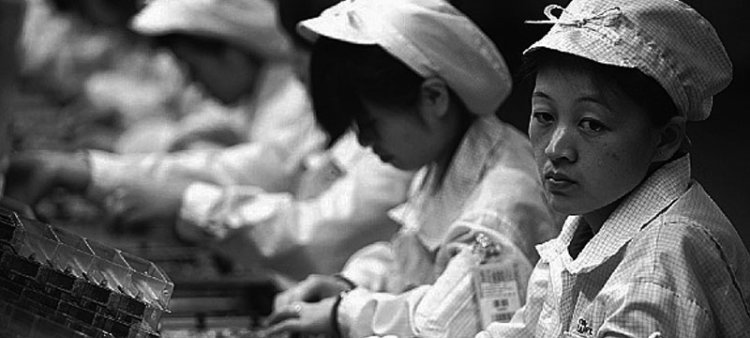
Intro
On October 5, 2015, the governments of Australia, Brunei Darussalam, Canada, Chile, Japan, Malaysia, Mexico, New Zealand, Peru, Singapore, the United States and Vietnam concluded negotiations for the Trans Pacific Partnership trade agreement. The ITUC and many trade unions oppose the TPP, as it fails to support good jobs, a clean environment and quality public services. To the contrary, it privileges corporate interests over workers’ interests. That is why trade unionists are lobbying their legislators to oppose the TPP, and asking them to sign the pledge. Below are those legislators who have already made the pledge.
We also call on you to contact your legislator and tell them to oppose the TPP. We cannot win if you do not do your part. You can also add your name to our list of citizens of the TPP countries who oppose the TPP.
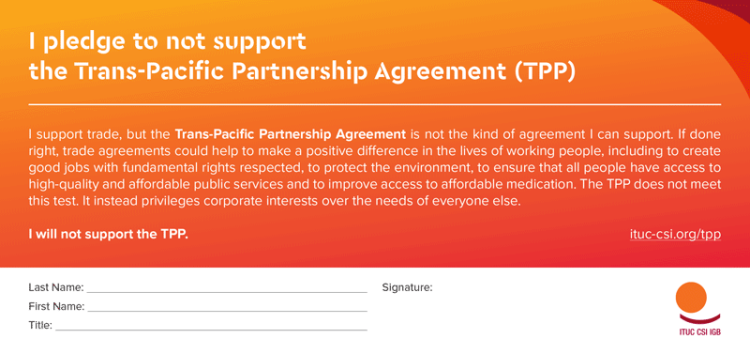
Intro
There are no jobs on a dead planet.
We must decarbonise our world by 2050. This requires major emissions reductions and universal access to breakthrough technologies.
Unions want a global agreement implemented on the basis of just transition principles and plans: national and industry/enterprise plans that protect and create new jobs by investing in the necessary industrial transformation.
This is the most significant challenge the world will face in the next thirty years, but we must start now or we will lose the war on climate change with horrendous consequences for all working people and their communities.
The ITUC will work with affiliates to mobilise for a global agreement that frames the possibility of industrial transformation and guarantees a ‘just transition’.
The ITUC affiliates are equally committed to organising the workers in emerging green economy jobs in both the formal and the informal economy.
Intro
The rise of corporate power and the decline in workers’ rights, wages and secure work are directly correlated. Governments are captured by corporations who dictate policy and regulation on nearly every aspect of our lives.
Labour is not a commodity: this principle is at the very heart of the ILO Constitution. Yet the global web of supply chains operates on this basis. Corporate power, profit and exploitation of labour and natural resources increasingly depend on this impoverished model of trade – global supply chains, a global trade which keeps millions of workers in poverty and precarious work.
More than 60 per cent of global trade is dependent on contracts in supply chains sourced from different parts of the world.
It is the real economy where working people are exploited through supply chains that are based on denial of human and labour rights, poverty wages and insecure or precarious work. It is a model that ruthlessly exploits the labour of women and migrants.
Under the umbrella of the logo ‘End Corporate Greed’, unions are organising for minimum living wages and collective bargaining, more secure and safe employment relationships, formalising informal work in supply chains, purging supply chains of slavery and universal social protection.
Intro
Forced labour is the very antithesis of decent work. Eliminating contemporary forms of slavery is a rights-based issue and a moral imperative for the union movement. Estimates show there are more than 21 million modern slaves worldwideForced labour in the private economy generates US$ 150 billion in illegal profits per year. Domestic work, agriculture, construction, manufacturing and entertainment are among the sectors most concerned. Migrant workers and indigenous people are particularly vulnerable to forced labour.
The model of slavery in Qatar is now a global scandal, but it will not be broken if we don’t escalate the demands of all nations to eliminate slavery and end forced labour; the kafala system and other policies that facilitate the worst form of exploitation must be overturned.
The Protocol to the ILO Forced Labour Convention (No. 29) has given renewed focus and energy to the determination to eliminate forced labour. We will organise for the ratification of the ILO Forced Labour Protocol in 50 countries by 2018 with relevant labour law reforms.
Intro
Around the world, working people and their trade unions are at the forefront of struggles to defend workers’ rights and freedoms. They are regularly the target of discrimination, oppression and even violence.
The labour movement is built on solidarity. Through its Countries at Risk work, the ITUC helps to coordinate international actions to support and defend trade unionists in countries where democracy and rights are under attack.
Intro
The challenges of global coherence are immense with continuing stagnating growth, historic levels of unemployment, a declining wage share and attacks on social protection, where it exists. Inequality is growing, the wage share of national income is among the lowest in history and the rapid expansion of supply chains as the dominant model of trade is impoverishing workers. Increasing levels of precarious work, informality and workplace safety are major issues for unions everywhere.
The ITUC is addressing these issues by campaigning for policies that put investment in jobs and creating demand through fair wages and social protection at the heart of economic growth and social justice.
The UN Sustainable Development Goals (SDGs) agreed in September 2015 include a goal for full employment and decent work, along with commitments to social protection. Union priorities for gender equality, quality education, health, food and energy security are included.
Intro
Labour migration feeds the global economy. There are around 232 million international migrants in the world today. At least 50 per cent are economically active. Around 50 per cent are women. Migration affects every region of the world, with many countries now simultaneously countries of origin, destination and transit. Vast numbers of people are on the move, not because they want to be, but because they feel they have no alternative. There are no jobs at home, no future, no life chances for them or their families. Or conflict may be raging in their countries. Many are prepared to risk it all, in search of any opportunity for a better life.
At the same time we have a near total collapse of the global governance of migration: the application of the rights-based body of international laws and standards that are supposed to govern the movement of people.
The importance of the application of a rights-based framework governing regular migration, refugees and asylum seekers, including the right to work without discrimination, is more urgent than ever.
Intro
There are 53 to 100 million domestic workers. The vast majority are women, and many are migrants and children. They cook, clean and provide care for people in their homes.
For decades domestic work was systematically excluded from labour legislation, since it was not recognised as work. As a result, these workers face multiple forms of exploitation including low pay or non-payment of wages, extreme working hours, abuse and even sexual violence and torture. Millions are enslaved in forced and child labour.
With the historic adoption of ILO Convention 189 and Recommendation 201 on 16 June 2011, domestic workers saw for the first time in history their work recognised as work.
Intro
The global workforce has approximately 2.9 billion people. Only 60 per cent work in the formal economy, and they have increasingly precarious employment arrangements while 40 per cent strug¬gle to survive in the desperation of the informal economy where there are no rules, no minimum living wages, no rights and no social protection.
The challenge for all levels of the global union movement is to organise – to organise both in the formal and the informal sector, and to do so in innovative ways.
Organising to grow and strengthen unions can only be sustainable if we engage workers on the issues that will improve their lives including wages, safety, secure work, rights and social protection.
Intro
Women’s trade union membership stands on average at 40 percent, yet women occupy only 15 per cent of the top decision-making positions in their organisations.
Women’s labour force participation rates are stagnating; young women continue to be disproportionately affected by unemployment; the gender pay gap remains at an average of some 20 per cent; women continue to suffer from segregation in low-quality and undervalued jobs and to be over-represented in informal and non-standard forms of work, as well as unpaid care work. Gender-based violence in the world of work is a significant barrier to women’s effective labour force participation.
Decent employment of women is the fastest and most sustainable way to drive growth and productivity. Organising around women’s economic and social rights can build workers’ power and deliver stronger, more representative unions that truly reflect the diversity of our membership at all levels, including the highest levels.
Intro
Welcome to the Just Transition Centre
Who we are and what we do:
The Just Transition Centre was established in 2016 by the ITUC and partners. The Centre brings together workers and their unions, businesses and governments in social dialogue and stakeholder engagement with communities and civil society to ensure that labour has a seat at the table when planning for a Just Transition to a low-carbon world.
A Just Transition secures the future and livelihoods of workers and their communities in the transition to a low-carbon economy. It is based on social dialogue between workers and their unions, employers, and government, and consultation with communities and civil society. A plan for Just Transition provides and guarantees better and decent jobs, social protection, more training opportunities and greater job security for all workers affected by global warming and climate change policies.
The Just Transition Centre works with stakeholders to accelerate the Just Transition process through:
- Empowering workers and their allies through sharing examples of Just Transition processes and plans, facilitating peer-to-peer skill and experience sharing, and capacity building on Just Transition.
- Documenting best practice in social dialogue processes through interviews, videos, reports and case studies.
- Starting and supporting social dialogue processes involving unions, communities, government and business, with participation from investors and experts.
- Strategic input to national and global policy dialogues and planning on Just Transition.
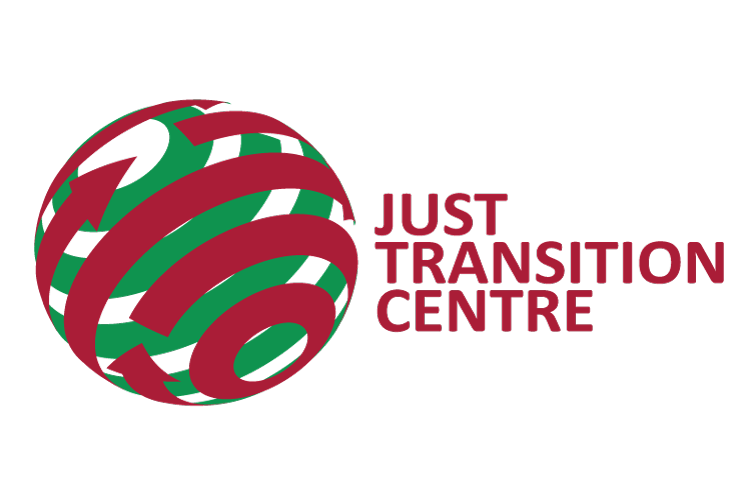
Intro
The ITUC Global Organising Academy provides organising training for Union Organisers and National Lead Organisers from ITUC affiliates and Global Union Federations which commit politically and through their own resources to a focused Organising agenda. It seeks to identify strong National Lead Organisers who are working on key campaigns and to train and mentor them to develop Strategic Organising skills. They develop campaign plans and engage with the Academy in long-term mentoring with the steadfast objective of organizing new members within workplaces, for a more successful collective agreement, and ultimately to drive social change and Build Workers’ Power.
Intro
Throughout 2018, the ITUC is promoting discussion and debate around the future of work, as part of the preparations for the ITUC World Congress in December 2018 in Copenhagen.
It is of the utmost importance that the debate on the future of work is shaped according to the priorities and policies of the trade union movement, and that it responds to our basic principles.
This information hub is designed to help ensure dissemination and exchange of reports, policies, union activities and other information relevant to the future of work.
The scope of future of work debates encompass macro-economic analysis, legal and technological advances and union organizing. The hub is therefore structured around four clusters of topics:
- The global economy
- Regulation
- Technology
- People and their unions
Please send us reports, documents articles, multi-media products etc from your organisation that you feel are relevant to the debate and which can be published openly. These may be sent to the email address [email protected]

Intro
Powerful corporate interests have succeeded over many years in weakening or eliminating legislation which regulates the private sector, through lobbying governments, corporate-friendly trade agreements and indeed through corrupt practices. This corporate capture of government is a major threat to a future that ensures good and sustainable jobs, secure incomes on which people can build a decent life, tax justice and a range of other matters which are crucial to prosperity for the many rather than the few.
The 2016 ITUC Global Rights Index revealed an increase of 22% in the number of countries with restrictions on freedom of speech, association and assembly, that 82 out of 141 countries surveyed exclude workers from labour law and that more than half exclude all or some workers from collective bargaining. Legal frameworks governing the employment relationship have also been eroded in many countries. Where good laws and regulations do exist, they are too often not enforced, while in some of the world’s richest countries in the Gulf, the total absence of rights leaves workers in modern slavery. Reversing the erosion of workers’ rights, by ensuring that governments fulfil their responsibilities to regulate, must be a central objective of trade union action around the future of work. Workers in the ‘digital economy’ must have the same rights and protections, including the ILO’s core labour standards, as other workers. Along with this, questions around regulation in a number of other areas will be vitally important. These include:
Global rules for global supply chains: With 50 of the world’s largest multinationals having a “hidden workforce” of 94% of the workers in their supply chains, governments, in particular in the home countries of these companies, need to make them legally accountable for due diligence throughout their supply chains, for ensuring fundamental rights and safe work for the entire workforce and for ensuring justice where rights are violated.
Modern Slavery: Some governments are now legislating to hold companies accountable specifically on the scandal of modern slavery in their businesses at home and abroad. Analysis of this legislation, its impact and enforcement and its deficiencies, will provide useful tools for the fight against modern slavery as a basis for political demands for governments everywhere to introduce legal requirements on companies, with appropriate penalties for non-compliance.
Definition of a business: companies such as Uber effectively operate in the informal sector, avoiding responsibility for the rights and entitlements of their global workforce. The ability of such companies to operate within, and often outside, the law, has major implications for workers, for tax receipts, public safety and a range of other areas.
Data protection and digital rights: employer monitoring and surveillance of workers is increasing dramatically, and related concerns about the vast collection, analysis and manipulation of data by large corporations, legal frameworks around the rights of individuals and groups to protection of their data, need also to be considered. The growing importance of algorithms being used to substitute decision-making by people is also leading to calls for regulation of how algorithms are deployed and for what purposes. The creator of the World Wide Web is now also warning about data abuse and the use of algorithms to influence elections, in ways that circumvent electoral law.
Competition law: the emergence of a relatively small number of multinational corporations into positions of dominance in the data marketplace globally poses major questions about the extent to which competition regulators are equipped and willing to ensure a level playing field, as well as to the adequacy of current competition laws and the extent of international cooperation in this field.
Taxation: Many of the multinational companies which derive all or much of their profits from collecting, manipulating and selling data are notorious for tax avoidance, and the expansion of internet-mediated production and services threatens to deprive governments of even more tax revenues. Some in the industry such as Microsoft founder Bill Gates now call for a “robot tax” even as Microsoft itself has faced criticism over its tax affairs.
Intro
The ITUC Global Organising Conference brings together emerging National Lead Organisers from across the globe. They come to develop their strategic campaign skills and spend time with other National Leads facing similar challenges. Union Organisers from at least 45 countries across The Americas, Asia Pacific, Africa, Europe and the Middle East/Northern Africa will attend.
The conference structure will be in-depth campaign analysis with the intention that National Leads will further develop their Strategic Lead Organiser skills. The 4-day conference will be composed of large group discussions, small-group campaign analysis, video featurettes, open regional discussions and practical skills engagement.
Campaign analysis workshops will investigate a theme affecting workers and unions across many nations. Practitioners will find this workshop useful to assist in thinking through campaign problems from a new perspective. They will find inspiration from other Lead Organisers, working on similar problems in a different context. Participants at the Conference will share stories and common experiences with others grappling with the biggest questions facing unions and organisers today. They will do all of this across national borders, regional distance, languages, and culture, union structure, gender, age, ethnic diversity.
Intro
Technological innovation has always been a part of the world of work, however in the past 20 years the internet has enabled dramatic and exponential increases in the pace of change. With the advent of the “Internet of Things”, the number of devices connected to the internet is expected to reach more than 20bn by 2020. Nevertheless, around 50% of the world’s people still do not have access to the internet. With much of the new technology coming into the world of work dependent either directly or indirectly on the internet, unless there is massive and rapid investment in connecting the remaining 50%, there will be a huge increase in inequality between the internet “haves” and “have-nots”, with dramatic economic and social consequences.
“Advances in technology and the expansion of internet access create enormous opportunities and challenges for working people. Union engagement in education, training and organising in the internet age is crucial. The ITUC is committed to internet governance which is free from domination by any government or corporate interest, and which ensures the free flow of information with strong protections for personal information and freedom of speech subject to the rule of law.”
Congress Statement of the 3rd ITUC World Congress (Berlin, May 2016)
Advances in robotics, nano- and bio-technology, machine learning, the Internet of Things and 3D printing in manufacturing, materials science and a host of other areas will deliver enormous benefits to society, and are already doing so in a number of areas, such as health and tackling climate change. At the same time, these advances will have profound consequences on employment and on workers. Some estimate that, over time, around 60% of jobs could be partially automated, with up to 10% of jobs being displaced altogether. Others forecast even greater impacts. Virtually all the studies show that lower-skilled or routine intensive jobs are most at risk, however there will also be impacts on more highly skilled occupations.
The TUAC document “Digitalisation and the Digital Economy” gives a good overview of the key issues, a number of which are highlighted in the following. While the specific impacts of various technologies in different sectors and occupations varies considerably and will continue to do so, there are a number of key overall trends and risks that, from a global perspective, are not being properly addressed:
- Digitalisation is contributing to fragmentation of work, breakdown of employment relationships and social dumping, as companies which organise work through online platforms (e.g. “ride-sharing” such as Uber and piece-work services such as Mechanical Turk and UpWork,) seek to expand and as they lobby effectively for deregulation. Governments need to ensure that these companies are regulated, that they pay a fair share of tax and that the people who work for them and with them have the same rights as other workers including through portable entitlements to social protection, pensions and other benefits;
- Significant skills gaps are emerging, limiting the potential for replacement of jobs lost to technology by new jobs which have higher IT, STEM or service content. These skills gaps need to be addressed through education and training systems that are in tune with the evolution of work in the digital age;
- Increasing reliance on digitally-mediated production and services requires high levels of cybersecurity to protect systems and avoid disruption. This poses particular challenges in ensuring that workers’ rights are not infringed, and also in ensuring that the growing skills gap in this field is addressed;
- For increasing numbers of workers, the “total surveillance workplace” is now a reality, with continuous and intrusive monitoring which sometimes extends beyond the workplace into private lives and gives employers unprecedented control. Some companies are also using social engineering techniques on their workforce to increase productivity and profits, but without commensurate increases in pay or protection from overwork and stress. This is linked to the overall issue of people’s rights concerning data about them, especially as a small number of “big data” corporations consolidate and expand their influence;
- The blurring of private life and life at work is also a reality for many, with disruption of work/life balance and often extra hours worked without compensation, especially in mobile work;
- Occupational and public health and safety standards are often not sufficient or sufficiently enforced as automation is deployed, frequently using poorly-tested algorithms, and as new materials are used in production processes;
- There is a pronounced gender gap in the information technology sector in particular, with women accounting for only around one-quarter of jobs. This gap is worsening where “old” jobs are being replaced with “new” jobs which have higher technology content, with women having as little as 20% chance of finding a “new” job compared to men. Urgent attention to this problem, including through education and training as well as anti-discrimination measures and maternity benefits, is required;
- The limitations of and potential damage caused by the deployment of algorithms, in particular with little or no human involvement, are becoming increasingly apparent. UNI Global Union is calling for the establishment of a global convention on the ethical use, development and deployment of artificial intelligence, algorithms and big data ; and,
- Developments such as the deployment of “blockchain” or distributed ledger technology by businesses in a number of sectors are likely to have unpredictable but potentially substantial impacts on the way businesses operate and on the nature of jobs in the future. Trade unions need to increase their understanding of the possible effects and uses of such systems, both in terms of the evolution of work and in potential uses of them by unions themselves to reach and organise workers.
All workers must have the fundamental rights to freedom of association and collective bargaining, protection from discrimination, exploitation and hazardous work, the assurance of a living minimum wage and social protection in the new world of work. Online platforms in particular must be required to ensure that workers’ social protection and other entitlements are met, and that their rights are respected.
The TUAC document “Digitalisation and the Digital Economy” sets out the key principles for ensuring a “digital just transition”. These include:
- Research and early assessment of social and employment impacts
- Social dialogue and democratic consultation of social partners and stakeholders
- Active labour market policies and regulation, including training and skills development
- Social protection, including securing of pensions
- Community renewal and economic diversification plans
- Sound investments leading to high quality, decent jobs.
Achieving a digital just transition will be challenging, in particular as many governments show no real inclination to ensure proper regulation of the digital economy or to protect and promote workers’ rights to social dialogue and bargaining collectively. Meeting that challenge will be central to ensuring the maximum social and economic benefits of digitalisation and avoiding a dystopian corporate free-for-all of yet greater inequality, insecurity and exploitation.
Intro
The failures of governance which led to the 2008 global financial crisis and the ensuing recession have, following more than two decades of corporate globalisation, deepened inequality, destroyed millions of jobs, increased precarious work and informalisation, and fuelled a tide of disillusionment which is being exploited by populist politicians across the world. It has also placed the global economy itself on a highly precarious footing, with economic demand stagnating due to lack of purchasing power.
Debate about the future world of work needs to identify solutions to the enormous economic and political challenges facing society, and avoid being confined to the narrow perspective of new technologies being implanted into a system which is already failing working people. Nor should it be about an “old” economy where work was mainly done by people and a “new” economy where work is automated and the tasks of those who do have jobs are governed by algorithms and apps.
The ITUC Global Poll has consistently shown overwhelming support for action to rein in the power of global corporations and the finance sector, to ensure secure and decent jobs, a fair share for working people through wages and social protection and other key objectives of the union movement. Governments have however not heeded this sentiment. Unless this changes, the transition into the future world of work will be disorderly and corporate-dominated, deepening insecurity and inequality yet further.
Governments and business need to recognise that the transition into a highly digitalised economy must be a just transition, with investment in the occupations, sectors and communities affected to maximise the quality and productivity benefits, while ensuring that those whose jobs are affected or at risk receive the necessary support. It must also support development and sustainability, especially through close connection with the UN Sustainable Development Goals and the transition to a zero carbon-zero poverty future.
For this to happen, urgent action, including by the G20, is needed across a range of key global challenges:
Wages and social protection – the world needs a pay rise: the falling wage share, with millions of workers in supply chains and the informal economy struggling even to survive, is causing untold misery and threatening the global economy itself as purchasing power stagnates. Unions across the world are campaigning for better wages, with a minimum living wage and extension of social protection to the 75% of the world’s workers who have no or insufficient social protection. Economic and social policies are needed to ensure a fairer distribution of income and wealth. The time has also come for an informed analysis of the benefits and costs of a basic income guarantee.
Closing the gender gap: the gender pay gap is the most tangible economic consequence of the systematic discrimination against women at work and in society that exists in every country. Where austerity policies have been imposed, it is women who have shouldered the heaviest burden, through unpaid work providing care and through disproportionate impacts on their incomes and opportunities. On current trends, the gender pay gap of 23% globally will not be closed until 2069. This alone demonstrates the gravity of gender discrimination and the absolute necessity for action to end it. The future of work must be a future where women and men are equal.
Taxation: rampant tax avoidance and evasion, especially by multinationals and the finance sector, is depriving governments of the revenue needed to deliver quality public services and social programmes. Stagnating wages and the “Uberisation” of work will mean that governments will be able to rely less and less on taxation of workers to make up for the low-to-zero taxes paid by the ultra-rich and many corporations. Privatisation and asset sales may provide governments with temporary fiscal relief, but at a huge cost to societies and economies. Tax justice is essential to ensuring that governments have the revenue needed to provide quality public services, social protection and the range of other functions that will shape the future of work based on social inclusion.
Investment in infrastructure and the care economy: the lack of infrastructure and the ageing of existing infrastructure in many countries is choking economic growth and hampering job creation. At the same time, demographic trends and inadequate existing provision are creating a time bomb in health and social care. Investment in the care economy and in infrastructure are not only vital to fix these problems – both types of investment create much-needed jobs and growth.
Climate change and industrial transformation: digitalisation at work offers tremendous potential to boost efficiency and replace carbon dependency with a renewables energy future. The global challenge to achieve a zero carbon zero poverty economy requires vision, commitment and courage by politicians and businesses alike. The key to achieving this is the agenda for a Just Transition, based on rights, social dialogue, investment in transition and negotiating change in industries and in the workplace that addresses climate change and creates the industrial transformation necessary to save humanity and the planet.
A coherent approach: In many countries, policies on digitalisation have been developed in government ministries responsible for technology with limited involvement from other ministries and little if any public consultation, leaving the private sector in the driving seat. This has begun to change, partly due to debates about the future of work, nevertheless only a few countries are undertaking the necessary “whole of government” approach along with engagement with trade unions and other relevant groups. Tripartite social dialogue must be at the centre of coherent and comprehensive approaches to the possibilities and challenges of digitalisation.
Trade and investment policies: The growing influence of populist and nationalist policies has had an impact on the international trade agenda, with many of the potential consequences not yet fully understood. While trade unions have mobilised against those elements of agreements which disempower workers and entrench corporate power over governments and that limit the space for good public policy making, the solutions offered by populists are not in the interests of working people. Provisions such as those contained in the proposed TiSA would lead to wholesale “Uberisation” of economies, and must be rejected.
Development: The adoption of the UN Sustainable Development Goals provides an agenda for development with decent work at its heart. The SDGs must not remain simply an aspiration – they provide an important universal framework for decisions about the future of work, and it is important that the implementation of the SDGs and decisions about the future of work, and in particular the role of government, are integrated.
Intro
For the trade union movement, the future of work starts now, and trade union organising, collective bargaining and political strategies to shape the future world of work are firmly embedded in the realities of working life today.
People have formed and joined unions for over 150 years to promote and defend their interests at work, and pursue broader goals of social justice, equality and democracy. Workers still come together to take collective action, even when the denial of their rights by governments and by employers is absolute, whether they be Uber drivers in Qatar , plantation workers in Honduras or workers in Asia’s supply chain factories .
In most countries, union membership is stagnant or in decline, as governments weaken or eliminate laws protecting fundamental rights to organise and bargain collectively, and impose yet further limits on freedom of speech and assembly.
Changes in the organisation of work in the era of globalisation, in particular through technological innovation, have made it more difficult for unions to organise. Growing fragmentation and precarity in the labour market are making the challenge yet harder. 40% of the world’s workforce is struggling to survive in the informal economy, and the majority of formal economy workers are experiencing levels of insecurity as never before - the ITUC 2017 Global Poll shows that 73% people are worried about losing their jobs.
In addition, erosion of the public sector, with its relatively higher level of union density, threatens both job security and social cohesion. The union movement faces the twin challenges of defending and promoting the public sector, as well as organising workers in privatised services, such as the growing numbers of women working in privatised care services.
At the same time, trade unions are the largest and most potent force for social justice in the world, with more than 200 million members, and with influence often beyond their actual membership through political action and through the positive impact, for workers who are not unionised, of collective bargaining and legislative gains.
The ITUC Global Poll has consistently shown huge public support for the core values and demands of trade unions and for the rights to organise, to bargain collectively and to take industrial action.
Building the power of workers has never been more important in the face of a dominant model of globalisation that has marginalised workers with insecure, low paid and often unsafe work. People know that the power has shifted. 93 percent of people say the economic system favours the wealthy rather than being fair to most people, and 90 percent say it’s time to re-write the rules of the global economy.
This puts unions on the frontline of defending of decent work, whether the work is done through direct employment, subcontracting, agency recruitment or contracted through digital platforms or other means.
All workers must have the same fundamental rights; the right to social protection, a minimum living wage, to collective bargaining and employer compliance with labour standards. Those employed through “digital platform” businesses are already organising and taking action. Unions will fight to guarantee that these rights are fully exercised.
With the rapid acceleration of technological change through digitalisation of production and services, and the use by companies of digital platforms to avoid their responsibilities as employers, unions are adapting their strategies, and will need to further adapt. Well-established principles and methods including cooperatives or other collective bodies, where digital work is organised and shared and a floor price is set, can be part of the answer.
Just as SEWA is organising cooperatives of self employed women workers in the poorest areas of India, Georgian unions are organizing informal transport workers, Sweden’s UNIONEN is working on regulation of platform businesses and digitalization for decentralised collective representation and Germany’s IG-Metall is engaging with “crowdworkers”.
The weakening of legal protections for workers is the result of companies looking to escape responsibility for an employment relationship. The responsibility of Governments is to hold them accountable as registered businesses which obey the rules of a social license to operate, including on taxes and social security contributions, minimum wages/contract prices and organising and bargaining rights.
Unions are working to shape the future of work through political action to challenge the dominant economic model and ensure decent jobs and rights for all workers, through negotiating and bargaining around new technology and industrial transformation, and through campaigning to increase the wage share and ensure living minimum wages.
Success will depend not only on effective action in these spheres, but also on organising workers from all sectors and all types of employment into union membership. At the global level, the ITUC is helping unions build strategic organising through the Global Organising Academy, complementing global campaigning and advocacy work. Global Union Federations too are shaping the future of work in their sectors through research, campaigning and organising.
With powerful corporate forces seeking to erode laws and standards yet further and deploying technology in a way that makes labour entirely subservient to capital, union action to shape the future world of work is indispensable not only to guarantee fairness at work, but to the very future of democracy and equality in every part of the world.
Intro
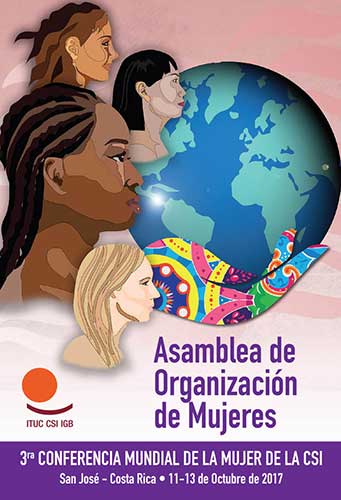 The 3rd ITUC World Women’s Conference/Women’s Organising Assembly is an important opportunity for women trade unionists from around the world to gather and strategise to advance gender equality and equity in the world of work.
The 3rd ITUC World Women’s Conference/Women’s Organising Assembly is an important opportunity for women trade unionists from around the world to gather and strategise to advance gender equality and equity in the world of work.
The Assembly takes place at a crucial time for women workers. We are living through a persistent global economic and jobs crisis, worsening impacts of climate change, deepening social and economic inequalities in many parts of the world, and the rise of populist misogyny and nationalism. Trade union organising and activism is all the more important if we are to change course and create the future we want for ourselves, for our families and for our communities.
The four priority themes of the Conference, shaped around the ITUC Count Us In Campaign, are:
- Peace, freedom and democracy
- The future of women at work
- Building and economic agenda for women, including the care economy & women in leadership positions
- Ending gender-based violence in the world of work
The methodology of the Organising Assembly will be highly participatory, placing art, activism, education, and culture at the heart of organising.
Intro
35% of women – 818 million women globally – over the age of 15 have experienced sexual or physical violence at home, in their communities or in the workplace. (Source: World Health Organisation)
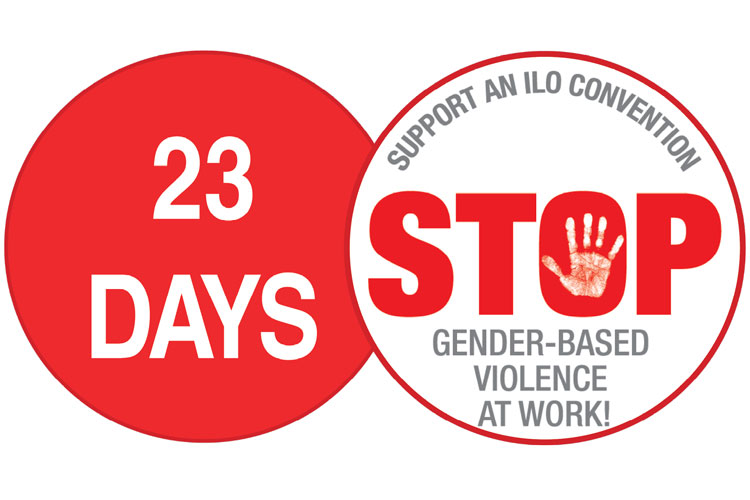
Intro
The Commonwealth Trade Union Group - founded in the 1970s - brings together more than 70 million trade unionists across the Commonwealth’s 53 countries. We are part of the Commonwealth family, and involvement in our activities is open to any trade union in a Commonwealth country. Administered from the ITUC head office in Brussels, we hold an annual meeting in Geneva at the ILO conference and send a major delegation to the biennial Commonwealth Heads of Government Meetings (CHOGM) as well as sending submissions to that and other Commonwealth Ministerial meetings. We helped form the Commonwealth Human Rights Initiative (CHRI). These pages report both on our direct engagement with the Commonwealth and also on trade unionism generally in Commonwealth countries.
Intro
Trust in democracy is broken. Only 30% of the world’s people believe their voice matters.
People want their governments to rewrite economic rules to promote growth and shared prosperity. They want governments to act in the interests of people. To build democracy will require governments to reframe their approach to planning and reporting such that it ensures accountability and transparency and is based on the rule of law.
This Frontline campaign frames a set of demands on governments around what things they should publicly report on to measure progress in a frame which is broader than simply GDP. It provides the framework for argument with the International Financial Institutions as to their responsibility to help build democratic policy foundations without conditionality.
The global trade union movement’s commitment to democratic rights and freedoms means workers are on the frontlines of increasingly autocratic governments and the extreme right. Where governments repress workers’ rights, the ITUC will act. Where exploitation of workers, denial of freedom of association and collective bargaining is part of a companies’ business model, the ITUC will act.
Intro
The global economic model has failed working people. The power and greed of huge global corporations have captured governments, which are acting against the rights and security of their own workers. In global supply chains, 94% of the global workforce is a hidden workforce where the obscurity of business contracts facilitates exploitation and oppression.
The world is three times richer than twenty years ago, yet seventy percent of people are denied universal social, protection, 84% of people say the minimum wage is not enough to live on and 81% of countries have allowed violations of the right to collectively bargain. This is inequality by design.
It’s time for a New Social Contract between workers, government and business which should include a floor of a universal labour guarantee for all workers.
Implementing a New Social Contract would make sure that rights are respected, jobs are decent with minimum living wages and collective bargaining, social protection is universal, due diligence and accountability are driving business operations, and that social dialogue ensures just transition measures for climate and technology.
Intro
Climate change left unchecked threatens everyone and will leave whole regions uninhabitable. Extreme weather events with lasting devastation are already destroying jobs and livelihoods.
We have eleven years to stabilise the planet at a 1.5°C temperature rise, yet governments are not taking responsibility to realise their targets. Every government must raise its ambition and determine national development plans, including Just Transition measures to protect workers, their families and their communities. Every employer must have a plan for climate proofing their operations, and Just Transition measures must be at the heart of such plans.
Unions are ready to engage in dialogue at all levels to ensure that Just Transition measures are adequate and to build people’s trust in a process that will realise the ambition we all rely on.
There are no jobs on a dead planet - the alternative is to build good jobs on a living planet.
Intro
Trade unions stand united against the forces of exploitation that drive people from their homelands in search of decent work opportunities. The vast majority of people that migrate are exposed to exploitation but through collective action, they are changing the rules of the game.
Modern slavery is a reality for too many people. Forced labour, bonded labour, human trafficking and child labour enter global supply chains. Solidarity is at the heart of the international trade union movement and the ITUC works to end this exploitation. The ITUC is pushing for fair recruitment of migrant workers and for the end of bonded labour systems.
RATIFICATIONS OF INTERNATIONAL CONVENTIONS ON MIGRATION
MIGRANTS’ RIGHTS ARE WORKERS’ RIGHTS
Intro
Working people systematically bear the overwhelming share of suffering that results from armed conflict. The shutting down of dialogue and of people’s freedom of association break down labour relations and open the door to widespread exploitation. Yet military spending is increasing and is helping to drive further devastation.
In response, the international trade union movement is committed to building peace. The ITUC, together with affiliated unions around the world, is working to restore avenues for dialogue that build the social consensus that is essential to lasting peace. The global risk of nuclear rearmament requires us to join allies in support of multilateral agreements from non-proliferation (NPT) to their outright ban (TPNW).
Intro
Despite unprecedented economic growth over the last decades, wages have stagnated globally and have not kept pace compared to rising productivity, nor unprecedented economic growth. Millions of workers across the world are not earning enough to live in dignity. Wage inequality is also increasing, with the highest-wage earners enjoying a wage rise multiple times faster than the average. The share of labour income in GDP is declining, and profits are not being shared with workers through pay rises.
Unions are campaigning in Africa, Asia, Europe and Latin America to demand fair and decent wages. They are calling on their governments to set minimum living wages, based on evidence on the cost of living and with the full involvement of social partners.
Unions are also campaigning to fix taxation systems that are allowing corporations to avoid their responsibilities to the society and public services we all depend on. Unions are moreover demanding that adequate, comprehensive social protection systems be put in place in order to guarantee income security for workers and their families as part of a comprehensive strategy of reducing inequality and promoting adequate living standards for all.
Intro
The predatory power of global corporations and their impact on the labour market have added to a growing number of workers forced into informal work. Now platform businesses are adding to that number with a business model that has little or no connection to national laws, taxation systems or employment responsibility. Governments are even entering bidding wars with taxpayers’ money to buy the physical location of corporate giants in their countries or cities. As corporate monopoly power grows, so does the opposition to freedom of association and collective bargaining.
Corporate and financial power can only be tamed by a determined regulatory approach at national and international level. To get there, they ITUC is working towards a UN Treaty on Business and Human Rights, nationally mandated due diligence and access to remedy and an ILO Supply Chains Convention.
Intro
Multilateralism is in crisis. Corporate interests have pushed it to the edge. International Financial Institutions have championed austerity and undermined the conditions of working people; trade rules have paved the way for the concentration of wealth into the hands of the few; and the UN system has been weakened.
The ITUC is working towards a New Social Contract that puts people back at the centre of multilateralism. The ILO has the authority to be a lighthouse in the crumbling multilateral system. Reforms at the IMF, the World Bank and the WTO are needed to put rules on profit to truly deliver rights for people.
Intro
While it is still technically feasible to avoid a 1.5˚C rise in temperature, behaviour and technologies will need to shift across the board in order to achieve these emissions reductions. Bold climate action can deliver USD 26 trillion in economic benefits through to 2030 (compared with business-as-usual) while generating more than 65 million jobs and avoiding more than 700,000 premature deaths from air pollution in 2030.
Through coordinated actions, unions have put a “Just Transition” approach to climate change in the Paris Climate Agreement and on the political agenda. This has led to the involvement of unions in national and sectoral climate policies.
Intro
Technology can provide opportunity, but it will also disrupt jobs and current supply chains. Digitalisation, automation and data all need to be managed to protect jobs and living standards. Full employment remains a goal of the union movement and no compromise will be accepted on the Universal Labour Guarantee. Just Transition measures are vital to realise these shifts.
Global governance of technological shifts must include a new standard on platform business, global standards on data management including protection and privacy, surveillance protections and more. These require union intervention and cross-border social dialogue with the collective bargaining strength to ensure Just Transition and employment plans.
Intro
The ITUC’s agenda is focused on the women’s full and equal economic participation and women’s leadership everywhere. Women’s labour force participation is below fifty per cent, and women’s share of unpaid care work has risen to the value of nine per cent of global GDP. Occupational segregation and undervaluation of women’s work persist as do the resulting gender wage and pension gaps.
Investing in care is a priority if we are to raise women’s labour force participation and access to decent jobs. The global pay gap is still twenty-three per cent and investment in quality public care services and social protection, the promotion of equal pay for work of equal value, and the introduction of minimum living wages with stronger collective bargaining remain the solutions to eliminate this discrimination.
Women on average still have only three-quarters of the legal protections given to men during their working life with only six countries providing equal rights and protections. This ranges from bans on entering some jobs to a lack of equal pay or freedom from sexual harassment, and it includes family law, property rights and other freedoms or entitlements.
The ITUC is committed to the elimination of gender-based violence in the world of work. This is a focal point for women to organise to see legislative and workplace justice.
Intro
Workers at risk of marginalisation, exclusion and discrimination must be welcomed in trade unions. Our first priority is to organise to include all workers. We are committed to building youth leadership in our unions and to supporting unions working for equal rights and treatment at work for racialised workers, migrant workers, indigenous people, LGBTQI+ people, workers with a disability, including those workers who face multiple and intersecting forms of discrimination and abuse.
Intro
Despite unprecedented economic growth over the last decades, wages have stagnated globally and have not kept pace with rising productivity. Millions of workers across the world are not earning enough to live in dignity. Eighty-three per cent of people in thirteen of the G20 countries believe that the minimum wage is not enough to live on, according to the ITUC Global Poll.
The share of labour income in GDP is declining, and profits are not being shared with workers through pay rises. Wage inequality is also increasing, with the highest-wage earners enjoying wage rises multiple times larger than the average.
Unions are campaigning together in Africa, Asia, Europe and Central America to demand fair and decent wages through the following regional campaigns:
- 100% Africa: Dignity, Value and Wages
- Cerrar la brecha - Salario digno
- ASEAN Fights for +50
- Fair pay in Eastern Europe: to eat, to live, to stay
Unions are calling on their governments to set minimum living wages, based on evidence of the cost of living and with the full involvement of social partners. Obstacles to freedom of association must also be effectively addressed. Collective bargaining on wages should be promoted, and agreements should have wide coverage and be enforced by law.
Adequate, comprehensive social protection systems – in line with ILO Convention 102 and Recommendation 202 – must also be put in place in order to guarantee income security for workers and their families as part of a comprehensive strategy of reducing inequality and promoting adequate living standards for all.
Intro
While the GDP of Sub-Saharan Africa has more than quadrupled in the last 15 years, this massive economic growth has not been shared among the large majority of Africa’s people. Poverty is staggering throughout the continent, and in 20 African countries more than half of the population lives below the national poverty line. Over 16% of the people on the continent are malnourished and levels of inequality are among the highest in the world.
Minimum wages on this continent are the lowest in the world, and many African countries do not have a minimum wage at all. At the same time, the possibility for workers to organize and collectively bargain for fair wages is also being compromised in many African countries as trade union rights are under attack.
With the 100% Africa: Dignity, Value and Wages campaign, unions across the continent are calling on their governments to set minimum wage floors that allow African workers and their families to live in dignity, and which will support African economic development. If African governments support and promote minimum wage increases across the continent, competition can no longer be argued to be a barrier. Respect for trade union rights, support for collective bargaining, and expansions to social protection are moreover essential. Unions moreover call on the African Union to coordinate these reforms and call for concrete, time-bound commitments for establishing minimum living wages.
Intro
South-East Asia has experienced massive economic development in the past decades, however it is clear that economic growth has not been shared equitably among the region’s people. Rather, it has mostly benefitted those who are already well-off.
It is unacceptable that many workers in the region continue to earn poverty wages and work under conditions of extreme exploitation. Minimum wages, in particular, remain dismally low compared to the cost of living in most countries. At the same time, the possibility for workers to organise and collectively bargain for fair wages is also being compromised in many countries in the region as trade union rights are under attack.
With the ASEAN Fights for +50 campaign, trade unions across the region are calling on governments to set minimum wage floors that allow workers in South-East Asia and their families to live in dignity, and which will support sustainable, inclusive economic development. When ASEAN governments support and promote minimum wage increases across the region, downward competition on the basis of low wages and poor working conditions can cease. A joint commitment to increase minimum wages by 50 USD, in order to support workers and their families live with dignity, would be a start. Unions moreover call on ASEAN to promote regional coordination on minimum wages.
Intro
Economic growth is slowly on the rise in Central America, but extreme levels of poverty, low and stagnant wages and rampant inequality are hampering its acceleration, in addition to having devastating consequences on the region’s people. Poverty is unacceptably high across the region - with more than half of the population living in poverty in a number of countries - and inequality levels in the region are also among the highest in the world.
Minimum wages in the region fail to provide an adequate wage floor that ensures all workers the ability to meet basic living expenses. They are dismally low, and they tend to be fragmented across sectors, regions, and enterprise types and leave out a substantial portion of workers. At the same time, the possibility for workers to organize and collectively bargain for fair wages is also being compromised in many countries in the region as trade union rights are under attack.
With the Cerrar la Brecha: Salario Digno (Bridge the Gap for a Decent Wage) campaign, unions across the region are calling on their governments to set minimum wage floors and adequate social protection systems that allow workers in Central America and their families to live in dignity, and which will support Central American economic development. Central American countries have already made commitments along these lines within the EU-Central America Association Agreement. Unions are therefore calling on their governments, as well as the European Union, to ensure that their commitments to decent wages and decent work are realised.
Intro
Despite steady economic growth across Eastern Europe over the past decades, in work-poverty is rampant and income inequality has increased. Poor working and living conditions are leading many people within the region to emigrate in order to seek better opportunities, with major consequences in terms of labour shortages and the sustainability of public finances. While all countries in the region have minimum wages, they tend to be extremely low and inadequate in affording workers and their families a decent life. Wage theft affects many workers in the region – with arrears in wage payments and non-compliance in paying minimum wages a regular occurrence in some countries.
With the Fair Pay for Eastern Europe: to eat, to live, to stay campaign, unions across the region are calling on governments to set minimum wage floors that would allow workers and their families to live in dignity, combined with adequate comprehensive social protection systems.
Unions insist that regional coordination on wages is necessary. Given the increasing economic integration across Europe, coordination between European countries on wages can help to stop downward competition on the basis of wages and social dumping, stem the tide of massive emigration from Eastern Europe and counter skills depletion.
The European Union must support a pay rise, and unions are calling on it to adapt its policies and instruments to better support its Member States achieve decent statutory minimum wages and strengthened collective bargaining. For those States outside the European Union, it must equally ensure that fair wages and decent work are properly considered within its trade and association agreements, as well as within enlargement processes.
Intro

This page contains information from ITUC affiliates, Global Union Federations and LabourStart about the COVID-19 coronavirus pandemic.
Blogs from Sharan Burrow:
- A New Social Contract can rebuild our workplaces and economies after COVID-19 (18 March)
- Climate and Employment Proof Our Future - A vision for a post-pandemic world (19 March)
- The $5 trillion commitment by the G20: Now, Make it Happen, Make it Work (28 March)
- Key workers can only protect us if we protect them (with Stephen Cotton) (30 March)
- The Greatest Display of Solidarity in Human History (30 March)
- Social protection systems underpin the most successful government responses to COVID-19 (8 April)
- We can applaud the women workers on the pandemic frontline but we also owe them the recognition of equal pay (17 April)
- Tackling the Covid-19 pandemic at the workplace (30 June)
ITUC News and Statements:
- G20 COVID: Trade Unions Call for Coordinated Action for Public Health, Jobs and Incomes (23 March)
- ITUC Global COVID-19 Survey: Half of countries in lock down as COVID-19 pandemic wreaks health and economic havoc on working people and their families (24 March)
- G20 Summit Shows Global Leadership: Now to Make it Work (26 March)
- Putting people first – 12 governments show the world how to protect lives, jobs and incomes (27 March)
- IMF/World Bank Spring Meetings Must Provide Global Leadership and Coordination (06 April)
- ITUC Global Covid-19 Survey: Regional differences exposed in government responses to the Covid-19 pandemic – millions of workers in Africa, Asia-Pacific and the Americas at risk of economic devastation (7 April)
- ITUC Global COVID-19 Survey: Global gaps in adequate provision of PPE and preparation of safe workplaces to protect workers from spread of Covid-19 in spotlight (28 April)
- ITUC - Key issues on the return to work (15 May)
- -* Social Protection with Health Care - Data from Selected Countries (May 2020)
- Covid-19 and Migrant Workers ‘ Rights (June 2020)
Other Resources:
- The Business & Human Rights Resource Centre (BHRRC): Union busting and unfair dismissals: garment workers during COVID-19
- Confederación Sindical de Comisiones Obreras (CC.OO.): Agreement on Equality at Work
- Building and Wood Workers’ International (BWI): COVID 19 News
- Education International (EI): COVID-19 tracker and COVID-19 Information Hub
- European Trade Union Confederation (ETUC): Trade unions and coronavirus
- IndustriALL: Union responses to the Covid-19 crisis
- International Federation of Journalists (IFJ): Covid-19: Report Safely
- International Federation of Musicians (FIM):Covid-19
- International Transport Workers’ Federation (ITF): Covid-19 updates
- International Union of Food, Agricultural, Hotel, Restaurant, Catering, Tobacco and Allied Workers’ Associations (IUF): COVID-19 Information and Resources
- LabourStart: News from the world’s trade unions
- Public Services International (PSI): Public Health, Once and for All! and Safe Workers Save Lives campaign
- Trade Union Advisory Committee to the OECD (TUAC): Mapping out trade union and social partners’ responses
- UNI Global Union (UNI): Unions global response to #COVID19
Intro
The Labour 20 – L20 - represents the interests of workers at the G20 level. It unites trade unions from G20 countries and Global Unions and is convened by the International Trade Union Confederation (ITUC) and Trade Union Advisory Committee (TUAC) to the OECD.
Intro
#Timefor8
The clock is ticking for a New Social Contract
The planet is facing multiple crises that are having devastating effects on people and the environment.
Our world is becoming increasingly unstable and dangerous as conflicts increase, global inequality rises, and the climate crisis worsens.
This situation is furthering authoritarianism, harming workers through attacks on trade unionists and erosion of labour rights and wages.
Workers and trade unions see the 2030 Agenda and its Sustainable Development Goals (SDGs) as the roadmap for global change.
Goal 8, on decent work and sustainable economic growth, plays a leading role. Its targets on employment, workers’ rights, decent work, social protection, inclusive growth, and environmental preservation provide strong leverage for the other SDGs of the Agenda.
This why trade unions call for an SDG 8-driven recovery, with a gender transformative New Social Contract based on (1) creating decent, climate-friendly jobs with a just transition; (2) protecting workers’ rights; (3) ensuring fair pay and wage equality; (4) providing universal social protection; (5) ending discrimination and promoting equality; and (6) empowering developing countries through inclusive development systems.
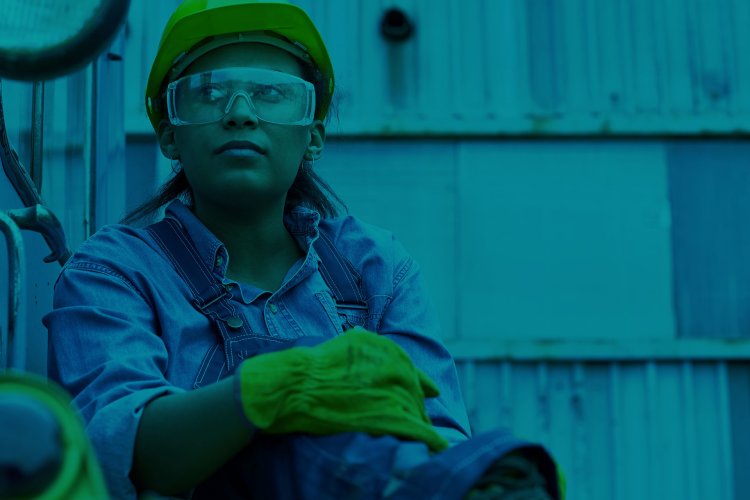
Intro
The ITUC is part of the Sport & Rights Alliance (SRA), a global coalition of trade unions and NGOs working together to embed workers’ and other human rights and anti-corruption across world sport and to promote the rights and well-being of those most affected by human rights risks associated with the delivery of sport, including children, women, activists, minorities, fans, athletes, and other workers.
The SRA was founded in early 2015 to pressure global sports bodies to ensure their decision-making and operations respect international standards for human rights, labour rights, and anti-corruption, in accordance with the UN Guiding Principles on Business and Human Rights.
The ITUC is a founder member of the Centre for Sport and Human Rights, an independent human rights organisation for the world of sport. Its mission is to advance a world of sport that fully respects and promotes human rights, including workers’ rights, by generating awareness, preventing human rights violations linked to sport and ensuring effective remedy for those who experience human rights abuses.
Intro
Each year the ITUC surveys the general public in a selection of countries working with international polling firms using online panels which meet best practice in the sector.
The ITUC’s research covers the following themes:
- The economic situation and household income;
- Laws protecting workers’ rights;
- Social protection;
- Government policies on employment, wages, the environment, technology, supply chains, migrants and refugees;
- Decent work, job security and working hours;
- Influences on government;
- Nuclear disarmament;
- The role of unions;
- Government support for fundamental rights at work;
- Technology and large digital firms; and,
- Discrimination and forced labour.
Intro
A NEW SOCIAL CONTRACT FOR RECOVERY AND RESILIENCE - GROUNDED IN EQUALITY AND EQUITY
Watch live !
- 4th ITUC WORLD WOMEN’S CONFERENCE: Programme: 3rd session - 16 November 2022
- Outcome document - 4th ITUC World Women’s Conference 2022
- ITUC report on care
- Workers Unite For The Right Of Everyone To A World of Work Free From Violence And Harassment: #RatifyC190
The 4th ITUC World Women’s Conference is an important opportunity for women trade unionists from around the world to discuss and strategise to advance gender equality and equity within the context of a global health, economic and social crisis and beyond.
The Conference takes place at a crucial time for workers and the trade union movement as the world is still navigating a global health pandemic which continues to claim lives, cause serious illness, affect livelihoods and disrupt our normal trade union activities. The current health crisis is being compounded by an unprecedented loss of jobs and workers’ livelihoods. While this is a crisis that affects us all, not all are affected in the same way, nor to the same degree. The effects of COVID-19 pandemic are not gender neutral. Understanding the gendered impacts of this crisis is crucial to shaping the most effective, efficient, and fair responses – both now and after the pandemic.
The main themes of the Conference are:
- The differentiated impacts of COVID-19 on women
- Building a caring economy - #InvestInCare
- Eliminating gender-based violence and harassment in the world of work – #RatifyC190
- Securing equal pay for work of equal value and gender-responsive social protection
- Building women’s transformational leadership in the unions
- Climate justice and just transition – women as actors for a just transition
- Women’s struggles for peace, freedom and democracy
- How do we ensure that equality and equity is at the heart of recovery.
The Conference will take an intersectional approach across the different themes that will be discussed and will be highlighting experiences of youth, older, indigenous, LGBTI+ women, racialised women and disabled women and inclusive of migrant communities and women working in the informal economy.
The Conference will be held in three stages:
- A virtual meeting will be held on 13-14 December 2021;
- A second virtual meeting will be held on 30-31 March 2022; and
- A physical meeting will be held in Melbourne, Australia, on 16 November 2022 (prior to the 5th ITUC World Congress)
Intro
The ITUC Congress Statement stressed the responsibility to frame a feminist agenda that is focused on the equal economic participation of women and women’s leadership everywhere.
With the pandemic crisis, women have been particularly hit hard losing around $800 billion in income – the combined GDP of some 98 countries. Early data suggests that only 43.2% of the world’s working-age women were employed in 2021, compared to 68.6% of working-age men.
This would mean that women’s working lives will be disrupted over a long period of time unless appropriate measures are adopted.
Women in trade union leadership has never been more important, being a key factor to promote a gender transformative agenda for recovery and resilience.
Although progress has been made, with women constituting 42% of the membership of ITUC affiliates, the number drops to just 7% who are in top leadership positions .
The ITUC Women in Leadership (WIL) programme aims to build a global pipeline of current and future generations of women leaders in the trade union movement, in line with the ITUC’s values and constitutional commitment to the promotion of gender equality.
Participants will be equipped to develop and advance the movement. This would include issues on which women’s campaigning and activism has been key and yielded significant results for sustainable and just workplaces.
The WIL programme aims at enhancing women’s leadership skills and building knowledge and capacities around the key workers’ demands for a New Social Contract and how these can help foster a gender transformative agenda within our movement.
The programme will be on-line and will include two main components:
- Overarching Curriculum including three modules on leadership building and development
- Deep Dives including modules on “Policy”, “Organising” and “Setting the Narrative”
Participate will be also supported by a mentoring component throughout the implementation of the courses.
Intro
Building on the engagement over the past years, the outcome document of the 4th WWC (2022) and the 5th ITUC Congress (2022) identified the care economy as one of the key political priorities to realise our demands for a New Social Contract, accelerating gender equality in the world of work and building a fairer and more inclusive society.
The International Day for Care, 29 of October, is an awareness campaign aimed at giving visibility to the importance of the care economy and, therefore, to pressure governments to foster:
- Increased public investments in the care sector.
Public investments in the care economy - as part of the national governments GDP – creating million of new jobs, granting women economic participation and guaranteeing universal access to quality public health, education and care services.
- Adoption of CARE policies.
Inclusive labour market policies, family-friendly workplace polices and gender responsive social protection grant a more equitable sharing of care responsibilities and promote flexible working arrangements on a gender-neutral basis.
- Decent work for all care workers.
Care jobs need to be formal and decent, with safe working conditions, and adequately remunerated, including equal pay for work of equal value. Care workers must be free from gender-based violence and harassment, and from any type of discrimination. Care workers must be free to organize and to bargain collectively.
The 2022 ITUC report “Putting the Care Economy in Place: Trade Unions in Action Around the world”, presents six case-studies showing trade union wins at the national level.
NEW: 29 October is now an official UN Day for Care!
The UN General Assembly adopted a Resolution for the International Day for Care and Support on 29 October in July 2023, building on the legacy of trade unions who initiated 29 October four years ago. Read here the ITUC Online.
Equal Times’ articles on CARE:
- In a sector built on historic injustice, can President Biden’s executive order finally deliver decent work for care workers in the US?
- Is the UK ready to invest in decent pay for adult social care workers?
- High value, low pay: the care sector in Spain
- By workers, for workers: in India, cooperatives are addressing care workers’ own caregiving needs
- In Canada, a historic move towards a nationwide childcare system draws praise, and criticism
- Can improving child and adolescent care infrastructure boost the economy and promote equality in Argentina?
- Spain extends rights for domestic workers but excludes the undocumented
- Trade unions in Dominican Republic want work-life balance rights to be recognised
Hashtags: #InvestInCare #Care2023
Download the social media materials on Trello: https://trello.com/c/X8j5QIag
The International Day for Care is supported by the International Trade Union Confederation (ITUC), Public Services International (PSI), UNI Global Union, Education International (EI), International Domestic Workers Federation (IDWF) and Women in Informal Employment: Globalizing and Organizing (WIEGO).
https://embed-assets.wakelet.com/wakelet-embed.js once per page —>
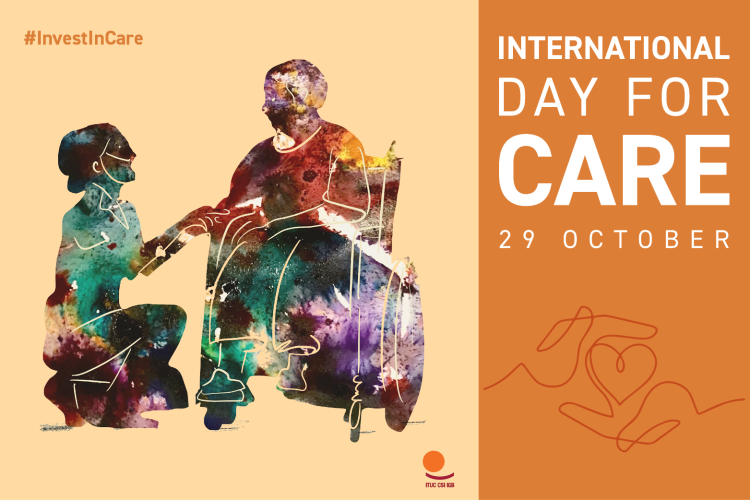
Intro
2024 is a pivotal year for democracy – 4 billion people in more than 60 countries will go to the polls.
As the largest democratic movement in the world, trade unions and working people are uniquely placed to define, defend and expand democracy, not only at the polls but also at work, in society and in global institutions. That’s why on 4 March the ITUC launched its campaign For Democracy.
In April, we begin our first round of global action: For Democracy in Society. Here’s what’s on the agenda:
- Before 19 April: Sign our global petition: Tell the World Bank to change course, support democracy in societies.
- 4 April: Join TUCA’s live international call for solidarity with Argentina’s unions, 09.00-12.00 UST (Montevideo).
- 9 April: Post your support for Colombian unions’ mobilisation for “life, social reform, and peace” on X. Follow the ITUC on X, Facebook and Instagram for more.
- 12 April: Post your support for Guatemalan unions’ proposals for a more democratic society on X. Follow the ITUC on X, Facebook and Instagram for more.
- 12-19 April: Join the global mobilisation in support of Belarusian trade unionists:
- Find or organise a solidarity action with trade unionists at a Belarusian embassy in your country.
- Organise a demand letter to be sent to Belarusian authorities from your organisation using this template.
- Make a solidarity video reminding Belarusian authorities that trade unionism is not extremism and calling for the release of imprisoned trade union leaders. Post it with #Solidarnast and #ForDemocracy, and send it to [email protected].
- 19 April: ITUC-AP will be delivering a joint message in solidarity with Myanmar’s trade unions to the Indonesian foreign ministry and ASEAN secretariat. Join them by posting your solidarity message on X. Follow the ITUC on X, Facebook and Instagram for more.
- 20 April: Share the ITUC’s video For Fair Taxes.
- 22-25 April: Use #HLPF2024 and #ForDemocracy to post your support for trade unions demanding development that delivers for workers during this year’s UN High-Level Political Forum on Sustainable Development. Follow the ITUC on X, Facebook and Instagram for more.
- 28 April-1 May: Post your support on X for ITUC Africa’s mobilisations in support of Liberian public sector workers. Follow the ITUC on X, Facebook and Instagram for more.
- 28 April: Find trade union actions in your country to support #IWMD24, because real democratic societies deliver climate protections for workers!
- 1 May: Under the banner “No Democracy without Trade Unions,” join trade union mobilisations in your country for May Day International Workers’ Day.
Can’t participate in these actions?
You can still join the fight #ForDemocracy:
- Check back here at ituc-csi.org/fordemocracy for updates on actions to join in April, June and September.
- ITUC affiliates and allied organisations: submit your upcoming democracy campaign actions to the ITUC at [email protected].
- Put democracy into practice by organising a trade union where you work. Find your sectoral union here.
- Support trade union demands in your country. Find your trade union national centre here.
- Tell your government to support the demands of the trade union campaign for democracy. Find your government’s UN representatives and ILO delegates.
It’s time that our international organisations, governments and corporations work in our interests, not special interests.
Stand in solidarity with working people and stand up For Democracy!
Here’s more information about the campaign for you to share.
